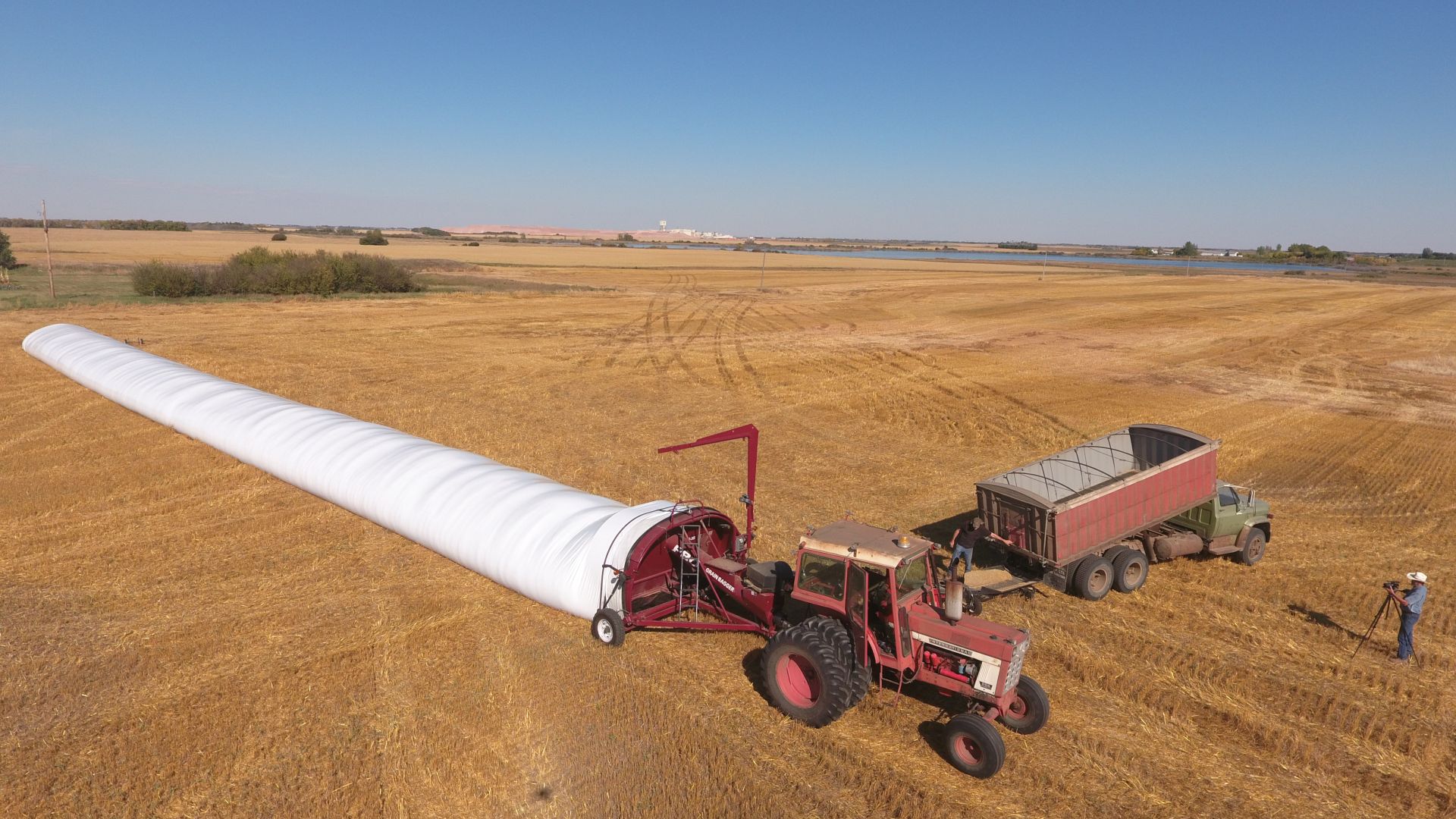Flaman Rentals Blog
RSS feed
Categories
Recent activity
- What's it like being a Flaman Rental Dealer?
- A Brief History of the Newest Flaman Store in Swift Current
- Disney's NEW Leadership Excellence Training Course
- Disney's Approach To Quality Service
- Disney's Approach To Quality Service
- Trailering 'Rules of the Road' Updated
- 10th Annual Frank J. Flaman Foundation Gala 2016
- Why Frank Cares
Authors
Archive
Be ready for harvest 2022: Summer is the time to build your bins & install your grain handling equipment
Posted by Calla Simpson Jun 24, 2022
Now that seeding is complete and the crops are growing, you may be starting to think about the next steps in your farming operation for 2022. This likely includes thoughts of additional Grain Storage, Grain Handling, and even Grain Drying equipment.
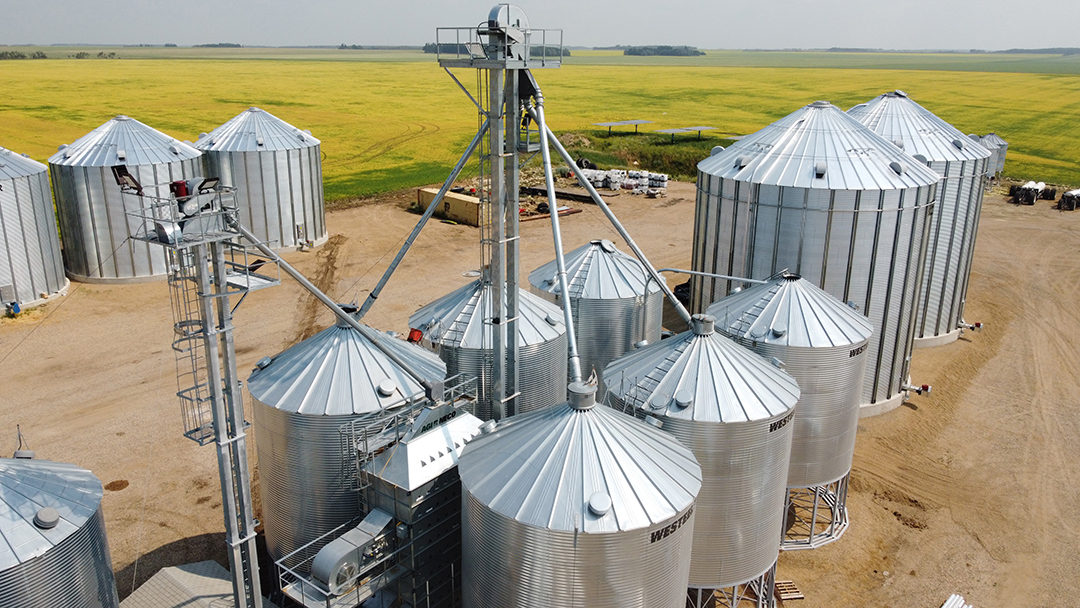
It may seem early to plan for harvest, but summer is a great time to build your bins and install your grain handling equipment to move the crop come harvest time. Buying now will ensure your equipment is installed and ready to go in the fall – so you can have peace of mind all season long.
Lean on the Pros
At Flaman, our Grain Systems team is equipped to work with you on developing your yard for the future. Let one of our industry experts come to your yard to measure, draw, and discuss your needs for the coming year. Our tactical approach provides you with various drawings and site layouts that can utilize your existing equipment, and plan for future expansion in a multi-phased strategy.

We can create a yard design based on your operational needs and the desired function of your site.
We specialize in full grain handling setups, including a wide range of bucket elevators and pneumatic conveyors – such as the Walinga Ultra-Veyor. Our turn-key offering also includes grain dryer systems, like the NECO Mixed Flow Dryer, as well as grain cleaning and processing facilities, automated bin sites, and producer loading sites.
Our team is here to guide the entire setup and installation process of your grain handling system and provide maintenance and service for every item that goes in and out of our doors.
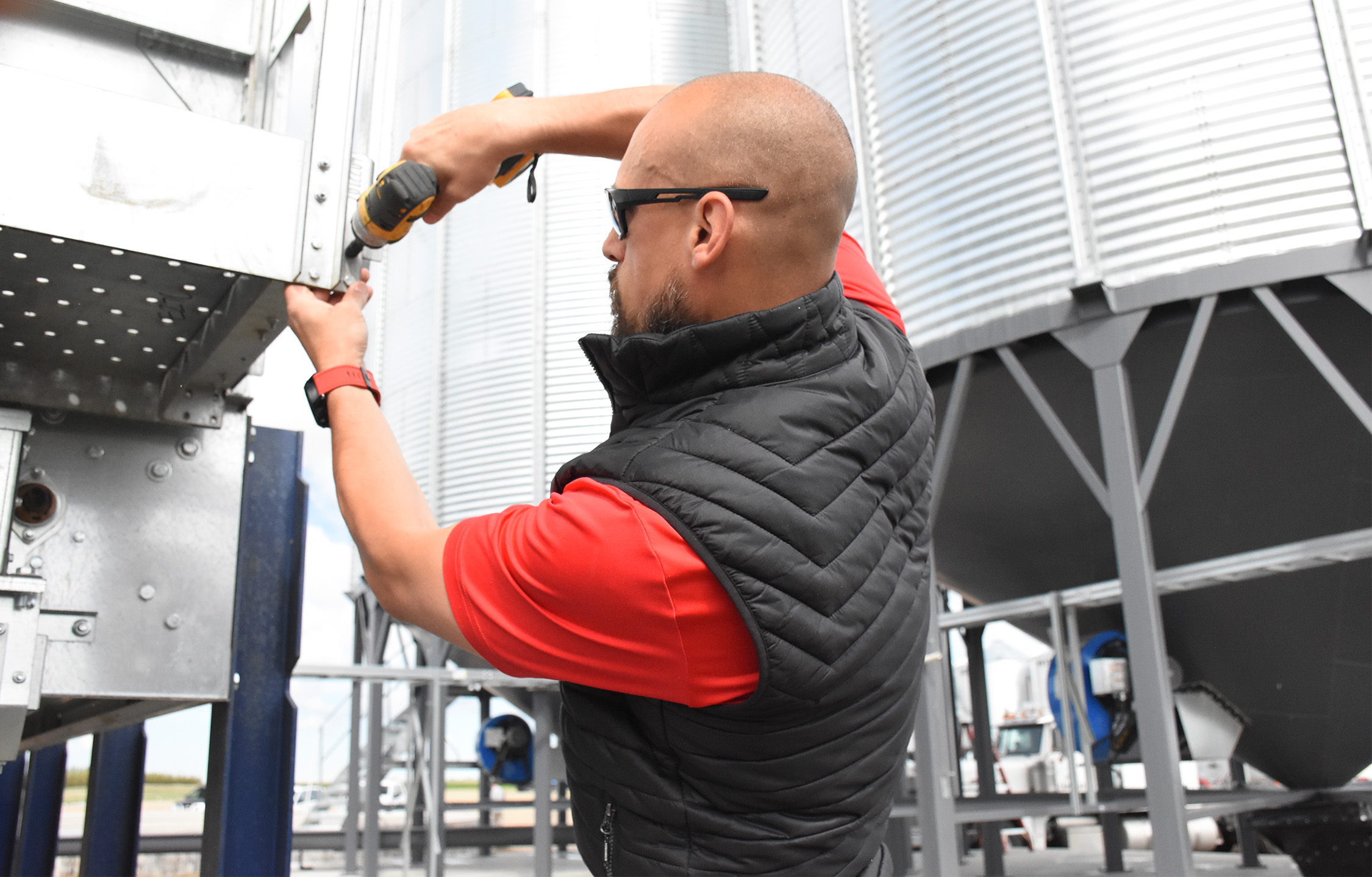
Schedule your appointment today for a free, no commitment site assessment.
-----
For more information on our grain handling and grain drying solutions, talk to one of our agriculture specialists at your nearest Flaman location.
Posted in Ag news | Tagged with grain systems grain handling grain drying grain cleaning turnkey bin site NECO Walinga | More articles by Calla Simpson
Why You Should Choose Flaman for Your Next Custom Screen Project
Posted by Calla Simpson Mar 18, 2022
Flaman Grain Systems is Western Canada’s largest custom screen manufacturer.
Not only do we stock over 50 varieties of material for any type of screen you may need, but we also have a team with over 50 years of combined experience in the Grain Systems industry.
From large terminals to small plants, we ship custom screen orders anywhere in North America – but especially throughout the prairies.

Inventory
One of the advantages of working with Flaman for your custom grain cleaning screens is our extensive inventory. We have 54 different types of screen materials in stock and on the shelf, as well as the frames to go with them.
 Round Hole, Slotted, and Triangular Screen Options
Round Hole, Slotted, and Triangular Screen Options
We have screens available for almost any make or model cleaner, as well as custom-built to your specifications. We offer round hole, slotted, triangular, wire mesh, and specialty perforating screens, with either wooden or aluminum frames.
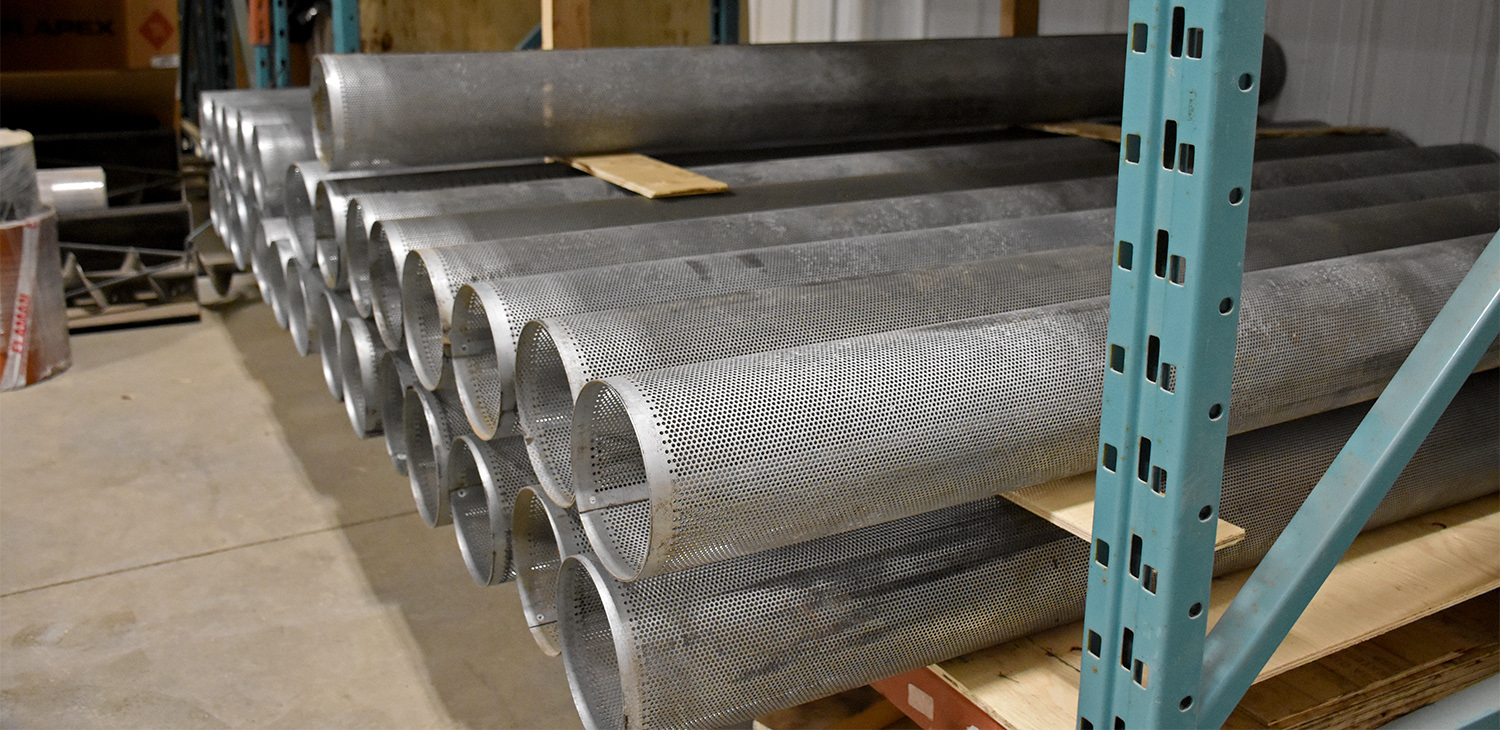 Grader Shells
Grader Shells
We also carry grader shells, scalper reels, indent shells, and ball racks, along with a full supply of durable hand screens and sieves in a variety of materials and sizes. Specialty order hand screens are also available.
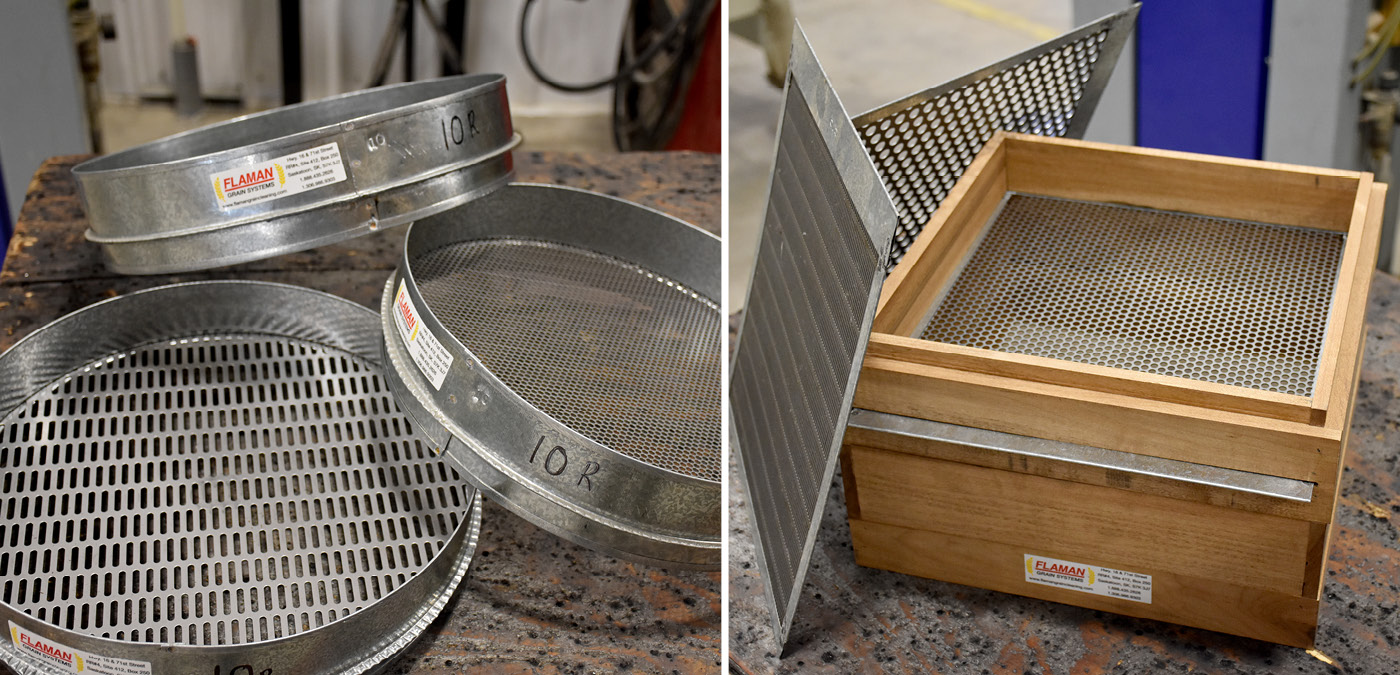 Hand Screens & Sieves
Hand Screens & Sieves
We begin by assessing your needs from technology to capacity, so we can accurately match you to the proper equipment for your grain cleaning operation. After we find the right machine for your farm or commercial operation, we work with you to determine the correct size and type of screen.
We hand screen grain samples for size and quality, so we can provide you with an accurate recommendation of screen sizes. Then we decide between wood or aluminum frames, wire meshes, or specialty orders, as well as any other accessories or add-ons.
All of our screens are manufactured in-house out of our Grain Systems shop in Saskatoon, Saskatchewan.
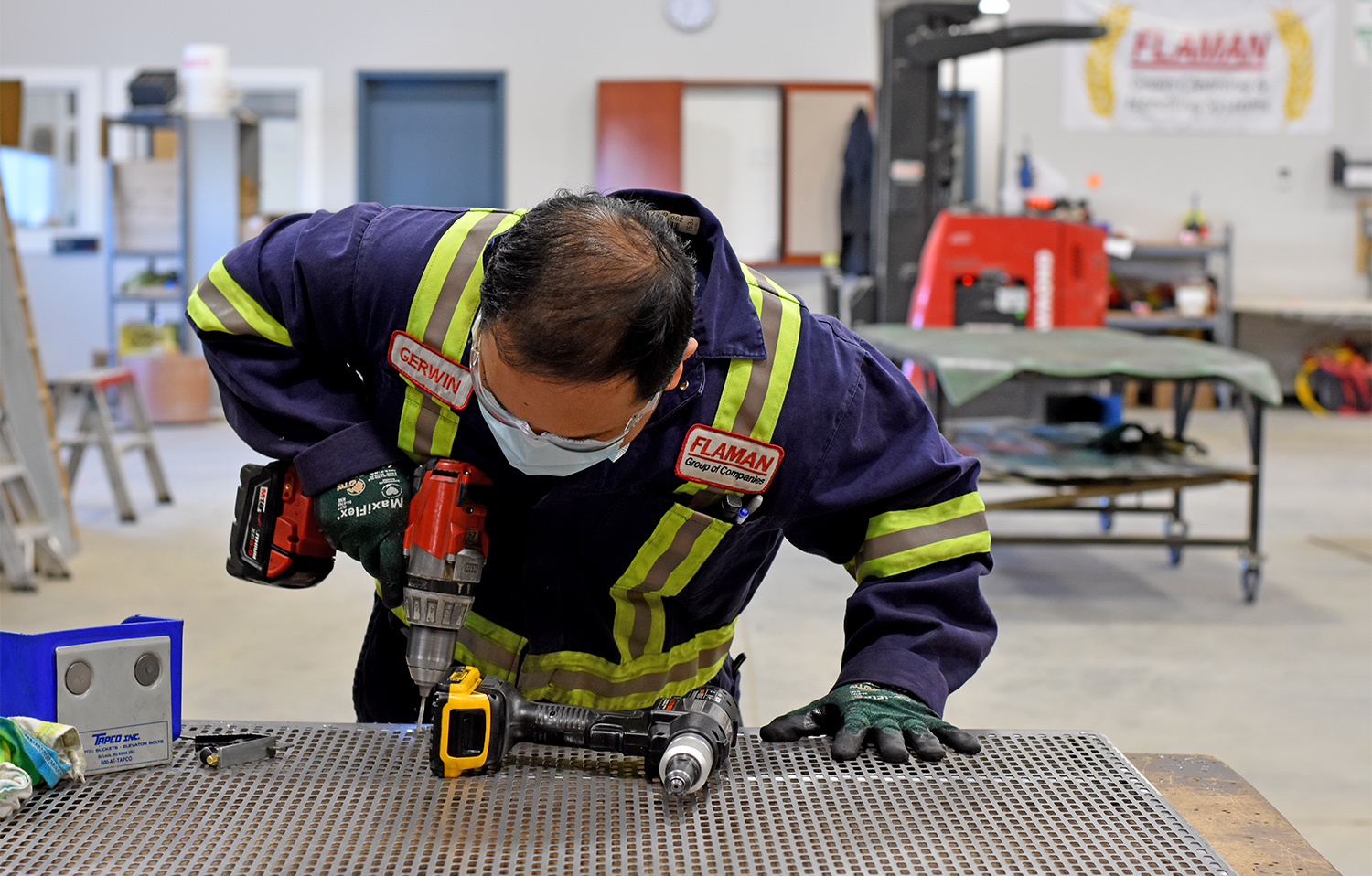
Experience
When it comes to our screen division, it is our people that really make the difference. From sales and operations to carpentry and welding, our team has long-term experience in the Grain Systems industry.
With over 20 years of experience with Flaman, Roy prides himself on getting the right equipment in front of his customers. Roy’s extensive grain cleaning knowledge and his passion for helping find solutions for his customers is the foundation of the Grain Systems team.
“My favourite part of working with this team is the people. We have a lot of fun here, too.”
 Roy, Shop Manager & Grain Systems Analyst
Roy, Shop Manager & Grain Systems Analyst
With a smile, Mike keeps the sales and operations side organized and running smoothly in a busy atmosphere.
 Mike, Grain Systems Sales
Mike, Grain Systems Sales
Our screen manufacturers are integral to the shop and the Grain Systems team. They are consistent, hard-working, and skilled woodworking and metal manufacturers. Gerwin has been with the company for over 12 years, and Wency has been part of the team for 10 years.

Wency, Screen Manufacturer
Both Gerwin and Wency are motivated by family and take great pride in their work. Their happy attitudes and humour make all the difference in making the workplace a positive environment.

Gerwin, Screen Manufacturer
From Start to Finish
At Flaman Grain Systems, we believe in supporting you from start to finish – from screen manufacturing and operations, right up to processing plants and turn-key grain system installations. This includes supplying, installing, and servicing various grain cleaners, bucket elevator systems, and other grain handling equipment.
 copy.jpg)
With our unmatched inventory and long-term experience, Flaman is a great choice for your next custom screen project.
When you buy from us you are not just buying a product, you are gaining the ongoing support of a team with over 50 years of experience.
-----
If you have any questions about screen manufacturing, or any of our on-farm or commercial grain cleaners, grain dryers, or grain handling equipment, contact us or visit your nearest Flaman location.
Posted in Division News | Tagged with grain systems grain cleaning grain cleaners screen manufacturing perforated screens custom screens processing plants | More articles by Calla Simpson
Need to move water? We have solutions
Posted by Calla Simpson Jun 11, 2021
With heavy rainfall in many areas across the prairies, you may be dealing with excess water on your farm, acreage, or worksite. Flooded ditches, construction sites, dugouts, or even just low-lying spots in your field can accumulate serious pools of water. Not to worry, though, we have a number of water pumps to help you move water quickly.
We have a large selection of water pumps ranging in size from 1” to 4” from brands like Honda and BE. We also carry two brands of floating pumps: Watermaster and Warthog. The Watermaster floating pump is a high-volume, low horsepower pump, available in either gas-powered or hydraulic configurations. The Warthog floating pump is a highly fuel-efficient piece of equipment that is capable of pumping continuously up to 15 hours at 850 gallons per minute (51,000 gallons per hour) and is so compact it can fit in the trunk of a car.

From right to left: BE water pump, Warthog floating pump, Honda water pump
For your existing spraying or pumping operation, we have all the hoses, fittings, and filters you will need to keep things running smoothly.
We carry a variety of spraying and pumping hoses including lay-flat, air-seeder, and industrial-grade suction hoses at an affordable cost. They can be purchased pre-cut to a specific length, so you can have the option to build your own efficient system right off the shelf.
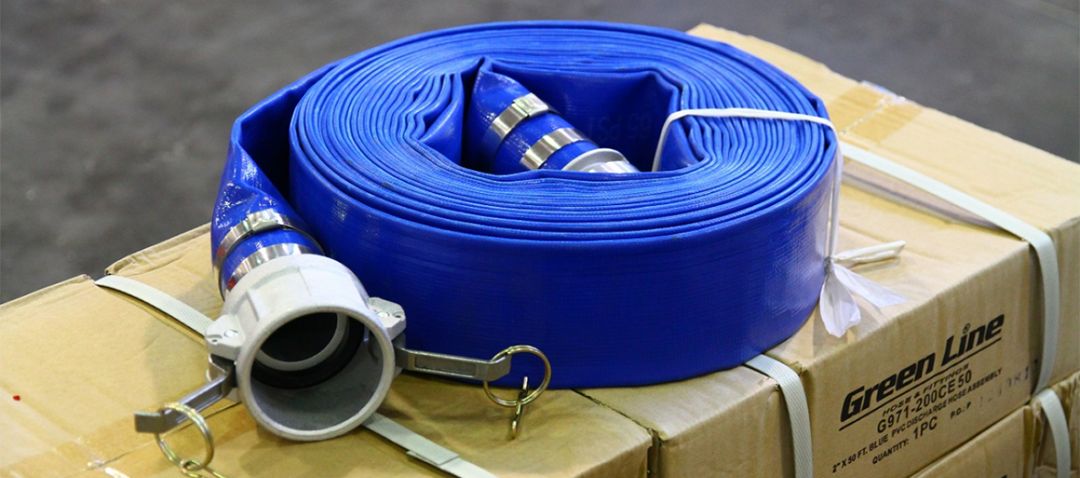
Our large selection of hose and pipe fittings are offered in both aluminum and plastic, with options for manifold or threaded style. We specialize in 1” to 4” size fittings that include cam locks, ball valves, reducers, pipe thread, flanges, and more.

We carry Super Flo water filters that are rated at over 4,000 gallons per hour and are equipped with easy-to-replace foam and mesh. If your pump to filter hook up needs some tweaking, we have adapters available for your convenience. We also carry filter floats at some of our locations, which are useful in removing some of the hurdles associated with pumping water – eliminating the need for waders and keeping your filter submerged in sloughs, ditches, ponds, and dugouts as low as 10” deep.
Filter Float demo video
-----
From water pumps, floating water pumps, filters, fittings, hoses, and accessories, Flaman is here to provide you with efficient, reliable, and cost-effective solutions to move water. To learn more about our selection of products or to get expert advice for all your water moving needs, talk to one of our team members at your nearest Flaman location.
Posted in Product Information | Tagged with water pumps filters fittings hoses Honda BE Robin Watermaster Warthog | More articles by Calla Simpson
Grain Bag Storage Maintenance Tips
Posted by Calla Simpson Oct 07, 2020
When dealing with a high volume crop, you may decide that short term storage is best to maintain the quality of your harvest. Grain bag storage is a flexible, cost-effective solution for short term storage of bumper yields, provided certain quality control steps are taken. Site preparation, site maintenance, and machine servicing all need to be done properly and timely to ensure your grain holds its quality and value.Below you’ll find tips on the preparation and maintenance steps required to ensure that grain bagging is a successful storage option for your operation.
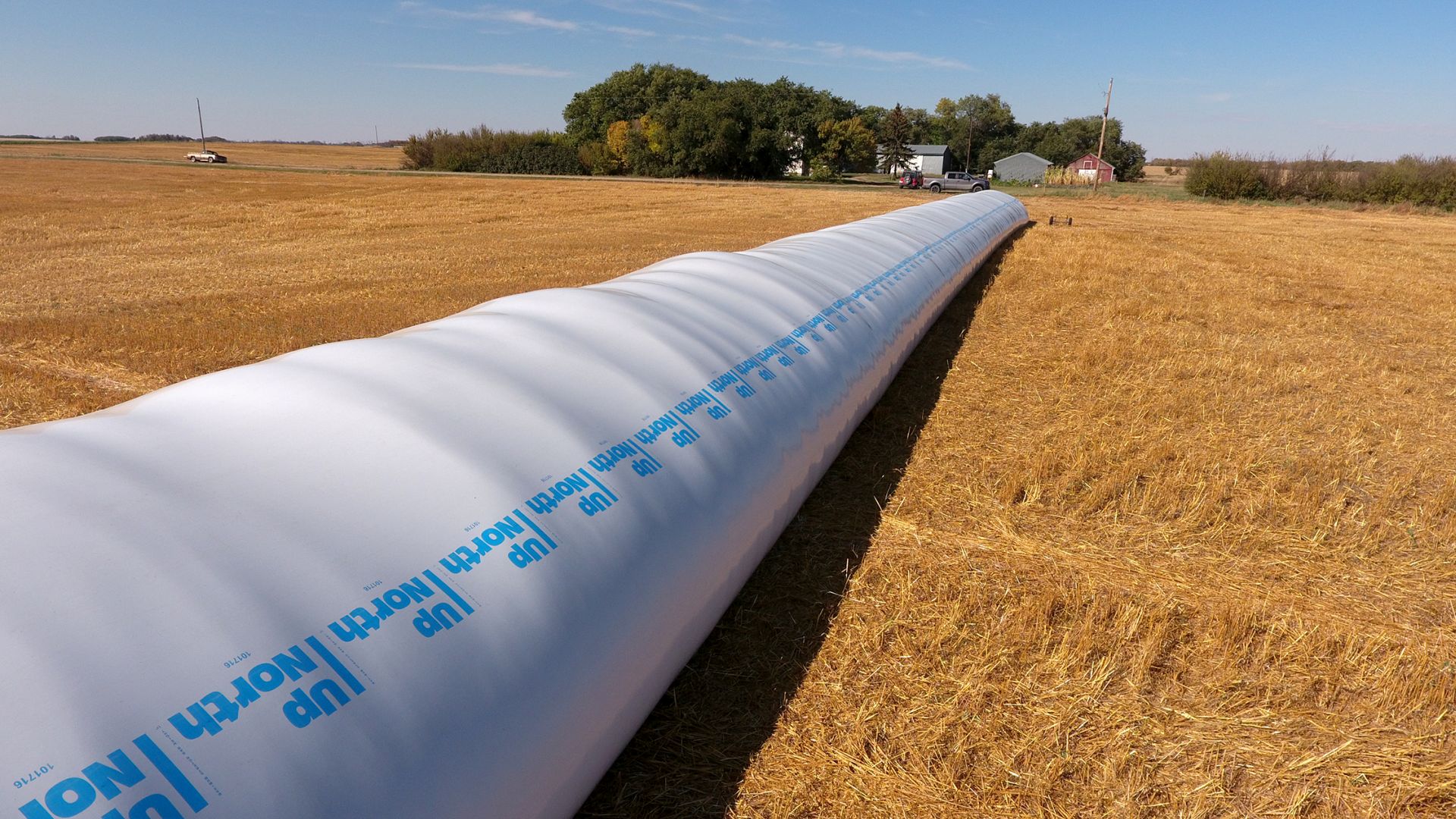
Site preparation makes for easier maintenance
Selecting the right site for your grain and production is key. It’s best to select a site that is accessible even when the weather is wet, and located in the open to help deter animals. Once an appropriate site has been found, preparing the site is the first step required to set yourself up for easier maintenance.
First, remove any debris such as sticks or sharp objects, then grade the site and ensure the ground is firmly rolled to prevent the grain bags from sinking or water pooling around them. If possible, spray the site with a rodent deterrent to prevent mice and vermin from burrowing under the bags once laid. If proper preparation is not completed, then the bag may not be impervious to air or liquid and can lead to grain spoiling.
Site maintenance once bags are laid and full
The biggest threat to the filled grain bags is animals, especially during the winter months. Snow can create drifts for deer to climb onto the bags, however, using pallets at the ends can deter them. An electric fence, or any sturdy fence, can be used to keep bears and deer away. Year-round, mice pose the biggest risk to the bags as they are known to burrow under, weakening the soil and allowing water to pool, and also chewing through the bag material causing wastage and grain spoilage.
Regular inspections of the bags are needed to ensure no damage from animals, weather, or insects. During wet weather, if the number of mice and vermin are up, then daily bag checks may be required to ensure they stay unharmed. In normal weather conditions, check weekly at a minimum. If there are any punctures, rips, or other damage visible, patching these will prevent moisture from spoiling the grain.
Machine servicing and maintenance
Regular maintenance of Grain Baggers and Grain Extractors helps ensure minimal downtime. Reading and following the manufacturer’s manual is key to keeping these machines in top condition. The manuals describe in detail the following mechanisms and their respective maintenance – the driveline, shear bolts, drive chain tension, and alignment along with the following items needing servicing – fluids and lubricants, auger wear plates, greasing, and servicing intervals. There is also a section on troubleshooting typical issues that can arise such as augers not running, the machine doesn’t move or low unloading capacity.
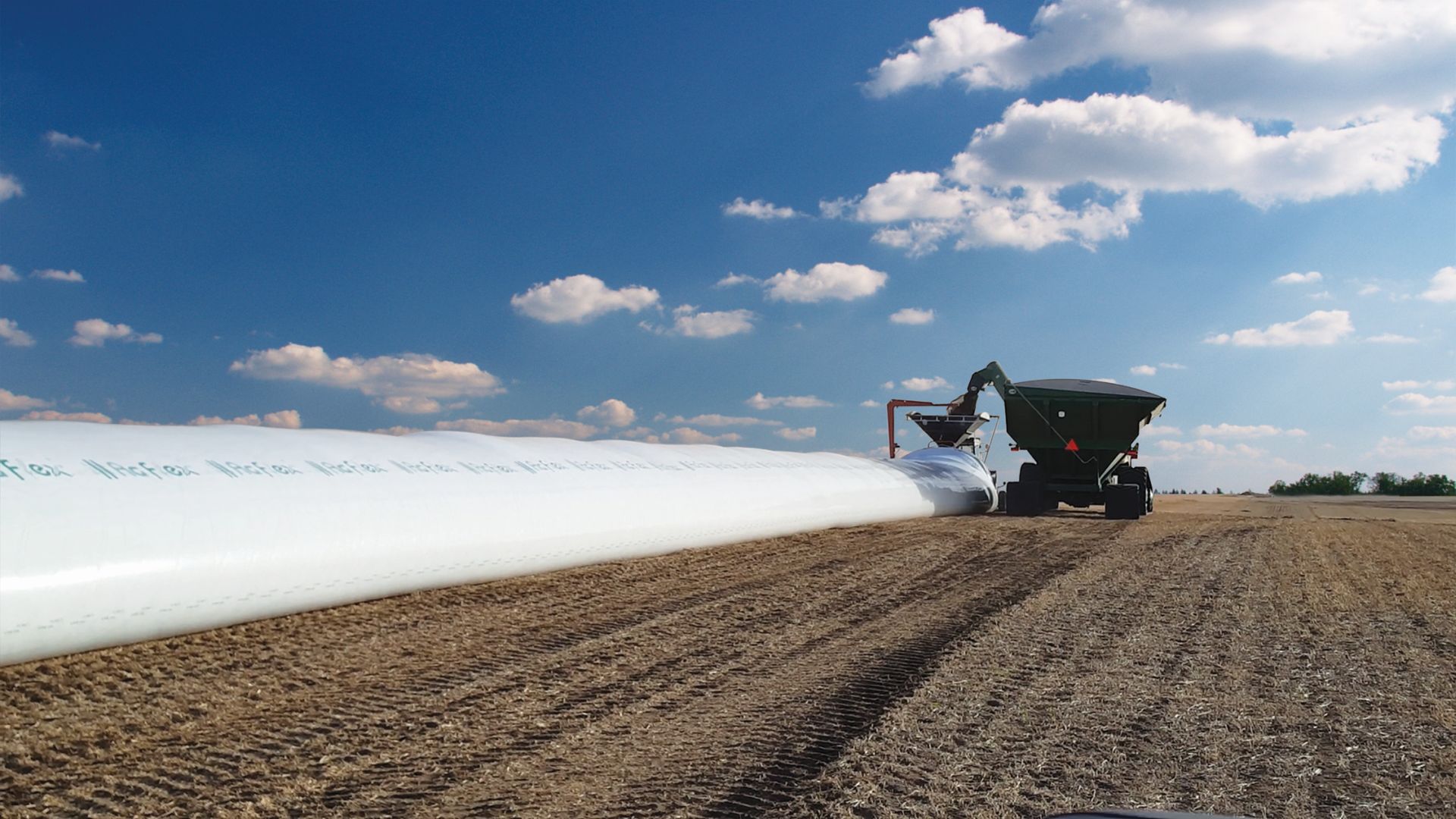
-----
Discounts available on bulk grain bag orders. For more information, talk to one of our agriculture specialists at your nearest Flaman location.
Posted in Product Information | Tagged with Pro Grain grain bags grain bagging grain baggers grain storage harvest | More articles by Calla Simpson
Beat the Weather with Grain Bagging
Posted by Calla Simpson Sep 11, 2020
The benefits of grain bagging are far and wide, chief among them being the ability to use the weather to your advantage. Since the weather can always turn and change on a dime, it’s important to work around it whenever possible, which is where grain bagging comes in. The airtight, controlled environment inside of a grain bag allows you to store grain and plentiful harvest in a dry space, even when the weather outside is less than ideal. By extending the storage life of your grain, allowing you to store more at once and giving you more flexibility in the way you do so, grain bagging gives people the option to have more options.

Pro Grain Equipment is most passionate about keeping operations running in all weather and situations, saving customers time and money. By grain bagging, you can get your crops off of the field by planning around severe weather to improve efficiency on all sides. The Pro Grain lineup of baggers and extractors work so you can work less, with impressive specs, heavy-duty designs, and improved ease and efficiency for your harvest.
Tip 1: Don’t push the limits of your grain.
Grain bagging allows for safer storage of grain, even during periods of severe weather and freezing temperatures. However, patience is key here. When loading the bags, the weather outside needs to be cool, and the bags should be sealed immediately to ensure that your grain isn’t sitting at a higher temperature than the outside environment. For grain with higher moisture levels, it needs to be dried as soon as possible after the winter season is over. Grain with a lower moisture content can stay in the bags a little bit longer. However, regular temperature monitoring is paramount to making sure that your grain stays in good condition.
Tip 2: Be smart about storage.
Severe weather comes with the territory when farming, and simply when doing anything related to the outside weather. Choosing a storage space that makes sense for your grain is of the utmost importance. When storing grain, look for a place that is highly elevated and away from any sort of drainage that could seep into your bags. You won’t want to store your grain in any manner that could allow natural drainage to affect it, especially during severe storms or periods of melting ice. Before choosing the storage spot for your grain, it should be examined closely to ensure a lack of flooding before severe storms and bad weather. Even though grain bags provide a dry environment for your grain, they can be more susceptible to bad weather — especially if you’re not strategic about placement. You may also want to look into the possibility of grain armor for your grain storage, which gives an extra layer of protection against both weather and wildlife.
Tip 3: Keep a watchful eye on the grain in severe weather.
Grain should be checked periodically, at least once a week, for punctures from severe weather or issues that can arise because of the outside environment. From cosmetic damage that could severely affect the quality of the grain inside to keeping a watchful eye on the temperature of the grain, it’s important to use the weather outside as a gauge for what’s inside your grain bags. By placing the bags in a north to south manner when storing them, the sun will heat the bags evenly for a more consistent environment inside the bags, regardless of the weather.
Tip 4: Be strategic about your timing for a better crop.
One of the biggest benefits of grain bagging is the added ability to increase efficiency by bagging grain right in the field. When you’re expecting severe weather around harvest, grain bagging allows you to control when the crop is loaded into the bags and the condition of the grain. Since grain bagging is a quicker alternative to more traditional means, it allows you to get to your crop before the weather does. Once the grain is in the bag, it’s essentially going to stay the same moisture as when you put it in. By being careful and strategic about your timing, you’ll be able to better store your crop and do so around bad weather.
A Pro Grain bagger in action during Harvest 2019
To learn more about grain bagging and to see which grain bagging products could improve your harvest capabilities, get in touch with us. We would be happy to walk you through everything you require for your grain bagging needs and answer any questions you might have.
-----
Now offering discounted pallet pricing when you buy four or more pallets of grain bags. For more information, talk to one of our agriculture specialists at your nearest Flaman location.
Posted in Product Information | Tagged with Pro Grain grain bags grain bagging grain baggers grain storage harvest | More articles by Calla Simpson
Reduce labour when filling bins: Automate your grain handling site with a Walinga Blower System
Posted by Calla Simpson Aug 31, 2020
A Walinga Pneumatic Blower System may be one of the most versatile pieces of equipment you can add to your Grain Handling lineup. The Ultra-Veyor is designed to fill bins of various heights and distances from the ground up, allowing you to easily add the system to any pre-existing site.
Walinga Sales Rep Doug Termeer explains how a blower system works
Many yard sites weren’t originally designed with the thought of adding a grain handling system or grain dryer down the line. As farms continue to grow, larger bins are being installed and grain storage is being built further and further away. The only way to hit all these bins of different sizes and distances economically is with a blower system. By allowing you to keep the current bins and other infrastructure you have already invested in, a Walinga Ultra-Veyor prevents you from having to redesign your entire yard site – saving you a lot of money in the long run.
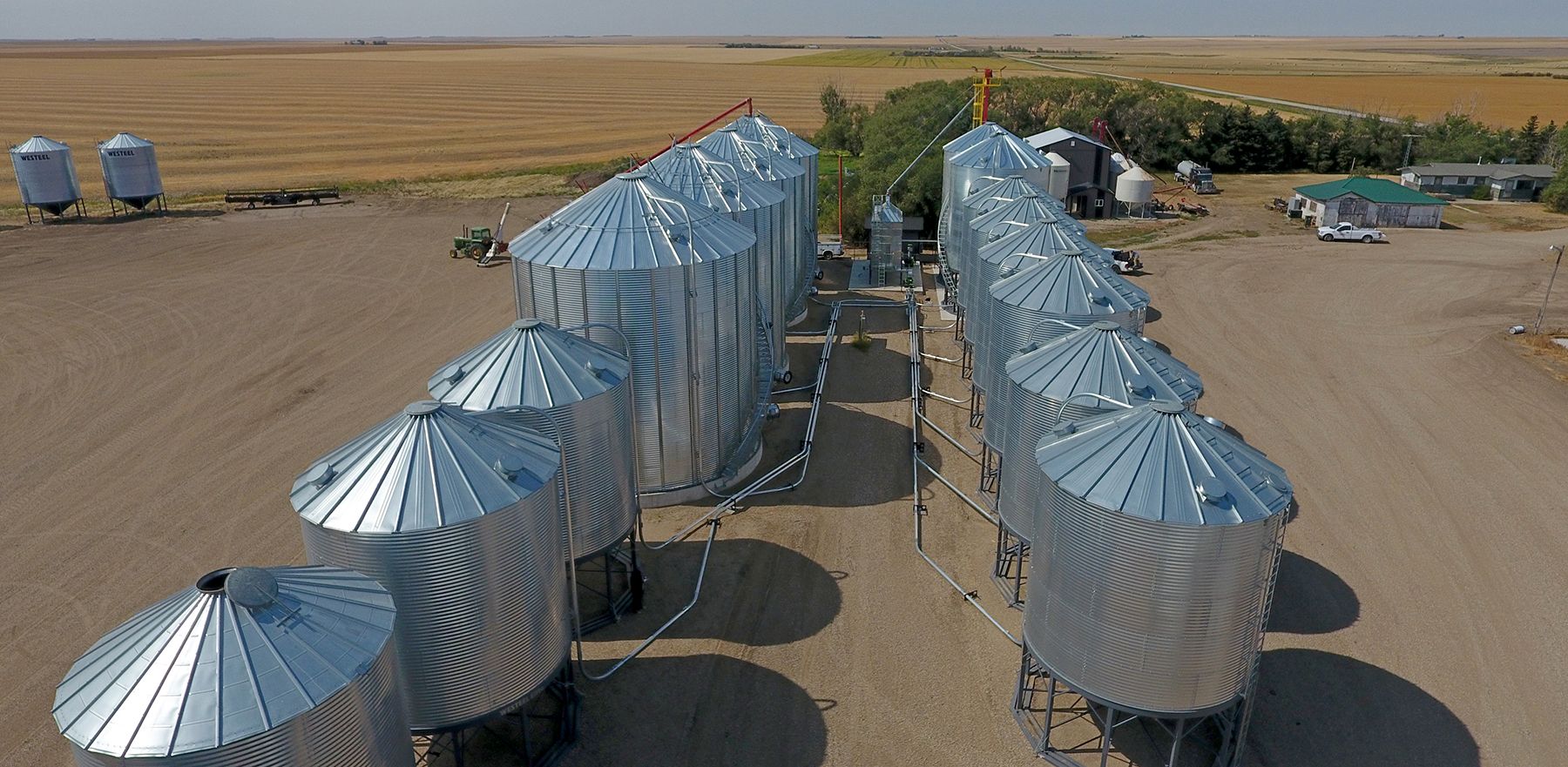 A grain handling setup in Saskatchewan utilizing a Walinga blower system to reach bins of various heights
A grain handling setup in Saskatchewan utilizing a Walinga blower system to reach bins of various heights
Walinga blower systems are also very flexible and expandable, so you don’t need to have your whole yard designed and planned out ahead of time. You can easily expand down the road as your business grows and you start to add more acres or dry more grain. These systems can be installed under driveways to reduce the risk of damaging any pipes as you load/unload trucks in your yard.
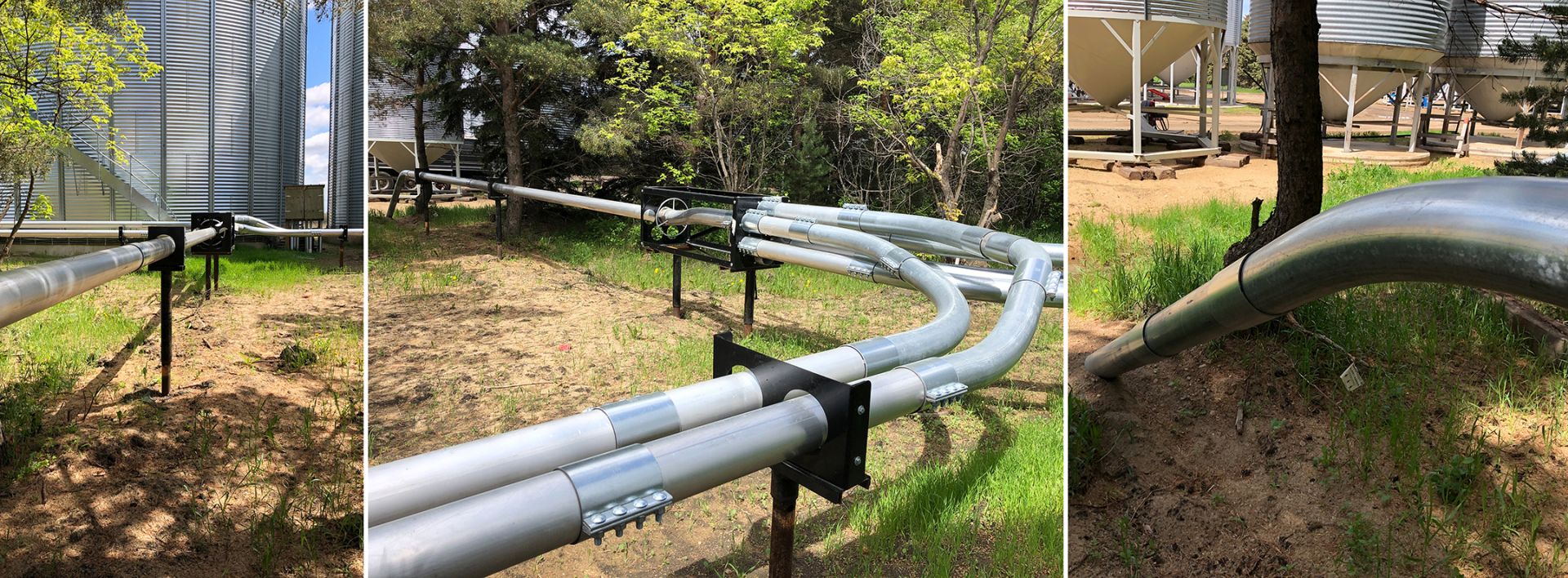
The Walinga Ultra-Veyor is also a great add-on to any grain dryer, especially continuous flow dryers like NECO. Automating your grain dryer and grain handling reduces the number of augers, legs, and additional trucking necessary to move grain around your yard. This maximizes accessibility to any drying or storage facility. Your grain can go straight from the dryer into the final storage bin, so you don’t have to move it around multiple times before you get it where you want it in the end. It’s faster, more efficient, and most importantly, safer.
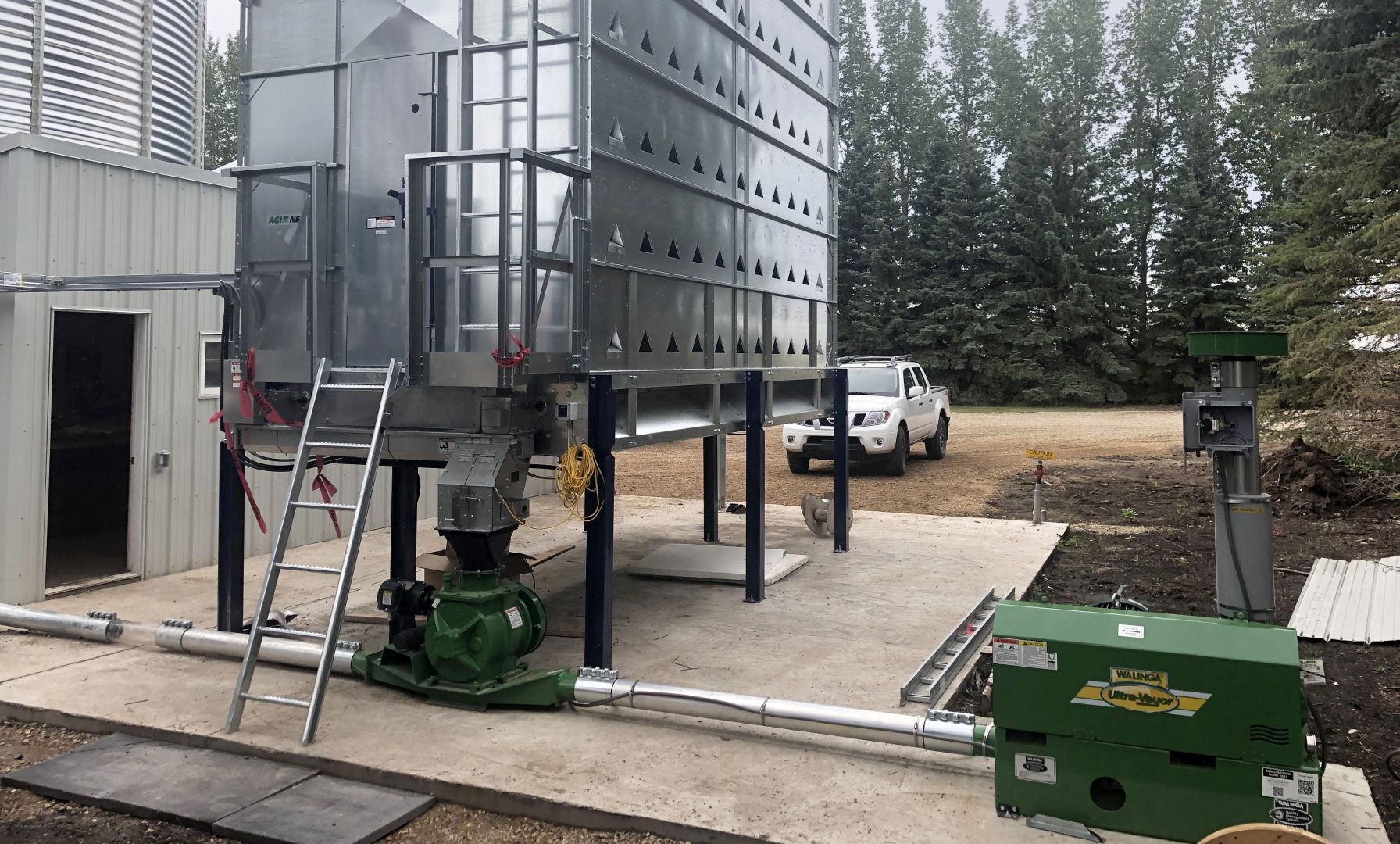
A NECO Grain Dryer unloading into a Walinga system
With the Smart-Flo feature on your Walinga blower, you have the ability to control the airspeed which reduces unnecessary damage to product and piping. This Variable Frequency Drive (VFD) system monitors and adjusts motor speeds depending on crop type, volume of product, and distance – optimizing performance and reducing energy costs. The Smart-Flo system can also be wired into your continuous flow grain dryer to speed up and slow down as necessary.
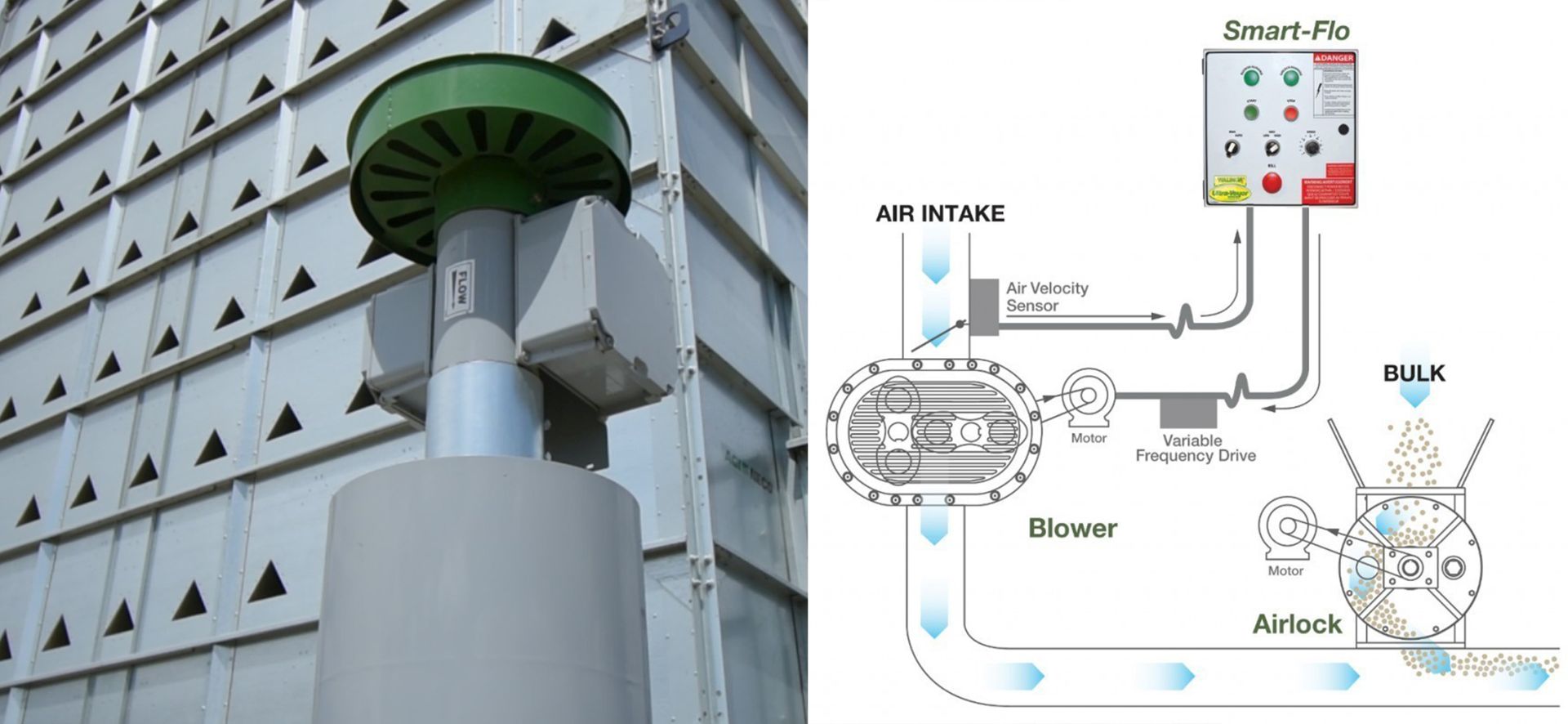
A blower system is not only an economic and affordable solution for long-distance conveying, it is also simple to install and is gentle on product – moving grain virtually dust and damage-free. Walinga Ultra-Veyors can move anywhere from 400 bushels/hour to 2,100 bushels/ hour, depending on the size of your operation.
Hear first-hand how a Walinga Ultra-Veyor made a positive impact on this customer's operation
Want to invest in a Walinga Pneumatic Blower system and automate your grain handling site this year? Contact us to schedule a free, no-commitment site assessment today.
-----
For more information on our grain handling and grain drying solutions, talk to one of our agriculture specialists at your nearest Flaman location.
Posted in Product Information | Tagged with grain systems grain handling Walinga Ultra-Veyor blower system NECO grain dryer | More articles by Calla Simpson
Reduce labour when filling bins: Automate your grain handling site with a Walinga Blower System
Posted by Calla Simpson Aug 31, 2020
A Walinga Pneumatic Blower System may be one of the most versatile pieces of equipment you can add to your Grain Handling lineup. The Ultra-Veyor is designed to fill bins of various heights and distances from the ground up, allowing you to easily add the system to any pre-existing site.
Walinga Sales Rep Doug Termeer explains how a blower system works
Many yard sites weren’t originally designed with the thought of adding a grain handling system or grain dryer down the line. As farms continue to grow, larger bins are being installed and grain storage is being built further and further away. The only way to hit all these bins of different sizes and distances economically is with a blower system. By allowing you to keep the current bins and other infrastructure you have already invested in, a Walinga Ultra-Veyor prevents you from having to redesign your entire yard site – saving you a lot of money in the long run.
 A grain handling setup in Saskatchewan utilizing a Walinga blower system to reach bins of various heights
A grain handling setup in Saskatchewan utilizing a Walinga blower system to reach bins of various heights
Walinga blower systems are also very flexible and expandable, so you don’t need to have your whole yard designed and planned out ahead of time. You can easily expand down the road as your business grows and you start to add more acres or dry more grain. These systems can be installed under driveways to reduce the risk of damaging any pipes as you load/unload trucks in your yard.

The Walinga Ultra-Veyor is also a great add-on to any grain dryer, especially continuous flow dryers like NECO. Automating your grain dryer and grain handling reduces the number of augers, legs, and additional trucking necessary to move grain around your yard. This maximizes accessibility to any drying or storage facility. Your grain can go straight from the dryer into the final storage bin, so you don’t have to move it around multiple times before you get it where you want it in the end. It’s faster, more efficient, and most importantly, safer.

A NECO Grain Dryer unloading into a Walinga system
With the Smart-Flo feature on your Walinga blower, you have the ability to control the airspeed which reduces unnecessary damage to product and piping. This Variable Frequency Drive (VFD) system monitors and adjusts motor speeds depending on crop type, volume of product, and distance – optimizing performance and reducing energy costs. The Smart-Flo system can also be wired into your continuous flow grain dryer to speed up and slow down as necessary.

A blower system is not only an economic and affordable solution for long-distance conveying, it is also simple to install and is gentle on product – moving grain virtually dust and damage-free. Walinga Ultra-Veyors can move anywhere from 400 bushels/hour to 2,100 bushels/ hour, depending on the size of your operation.
Hear first-hand how a Walinga Ultra-Veyor made a positive impact on this customer's operation
Want to invest in a Walinga Pneumatic Blower system and automate your grain handling site this year? Contact us to schedule a free, no-commitment site assessment today.
-----
For more information on our grain handling and grain drying solutions, talk to one of our agriculture specialists at your nearest Flaman location.
Posted in Product Information | Tagged with grain systems grain handling Walinga Ultra-Veyor blower system NECO grain dryer | More articles by Calla Simpson
Early season utilization: Increase the grade of your grain with a NECO Grain Dryer
Posted by Calla Simpson Aug 26, 2020
As harvest is well underway in most areas of the province, many producers are utilizing their grain dryers early on this season and increasing the available window to combine. Some farmers have even noticed increases in their durum quality as their grade improves after drying.
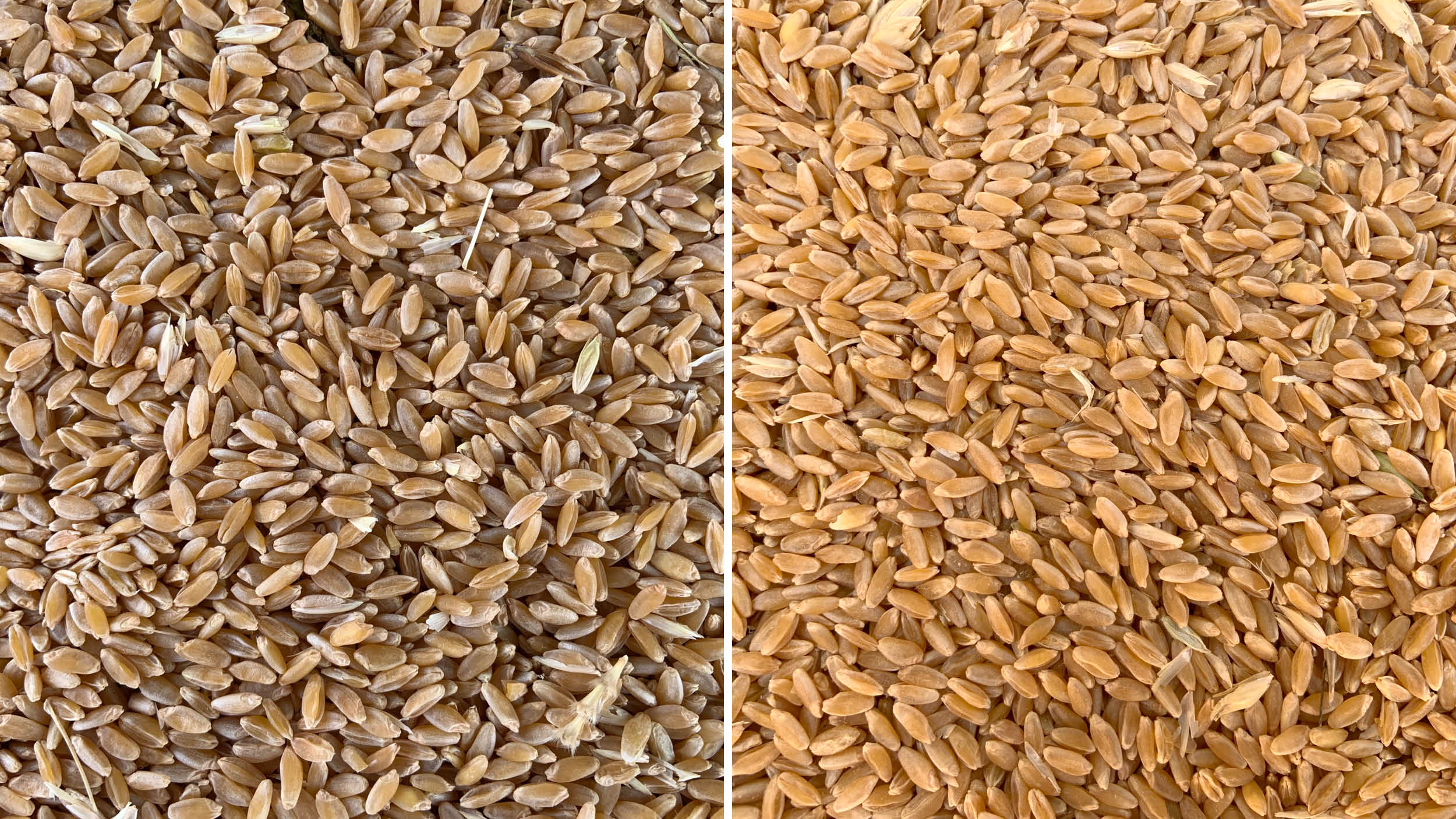 20% moisture durum before going into the NECO grain dryer (left) and 14.5% moisture durum after being dried (right)
20% moisture durum before going into the NECO grain dryer (left) and 14.5% moisture durum after being dried (right)
Nolan Gettis, a farmer in central Saskatchewan, discusses how his NECO Grain Dryer has improved his operation:
“Two years ago, I would have been waiting to combine saying, ‘It’s getting close’. Right now, I’m full on harvesting because I have this dryer as a tool. I’m not waiting to use it. I’m literally taking off 20% durum and it’s coming out dry and just shining. It’s amazing how much better this durum looks once it comes out of that dryer. When you have a crop of unicorn #1 amber durum, you’ve gotta go get it.
I’d have to say the biggest benefit of this NECO dryer is that we’ve taken on more acres this year and I’ve already conquered that land without buying another combine. I have three bins on the go; a dry bin, an aeration bin, and the dryer. It’s a total harvest management tool.”
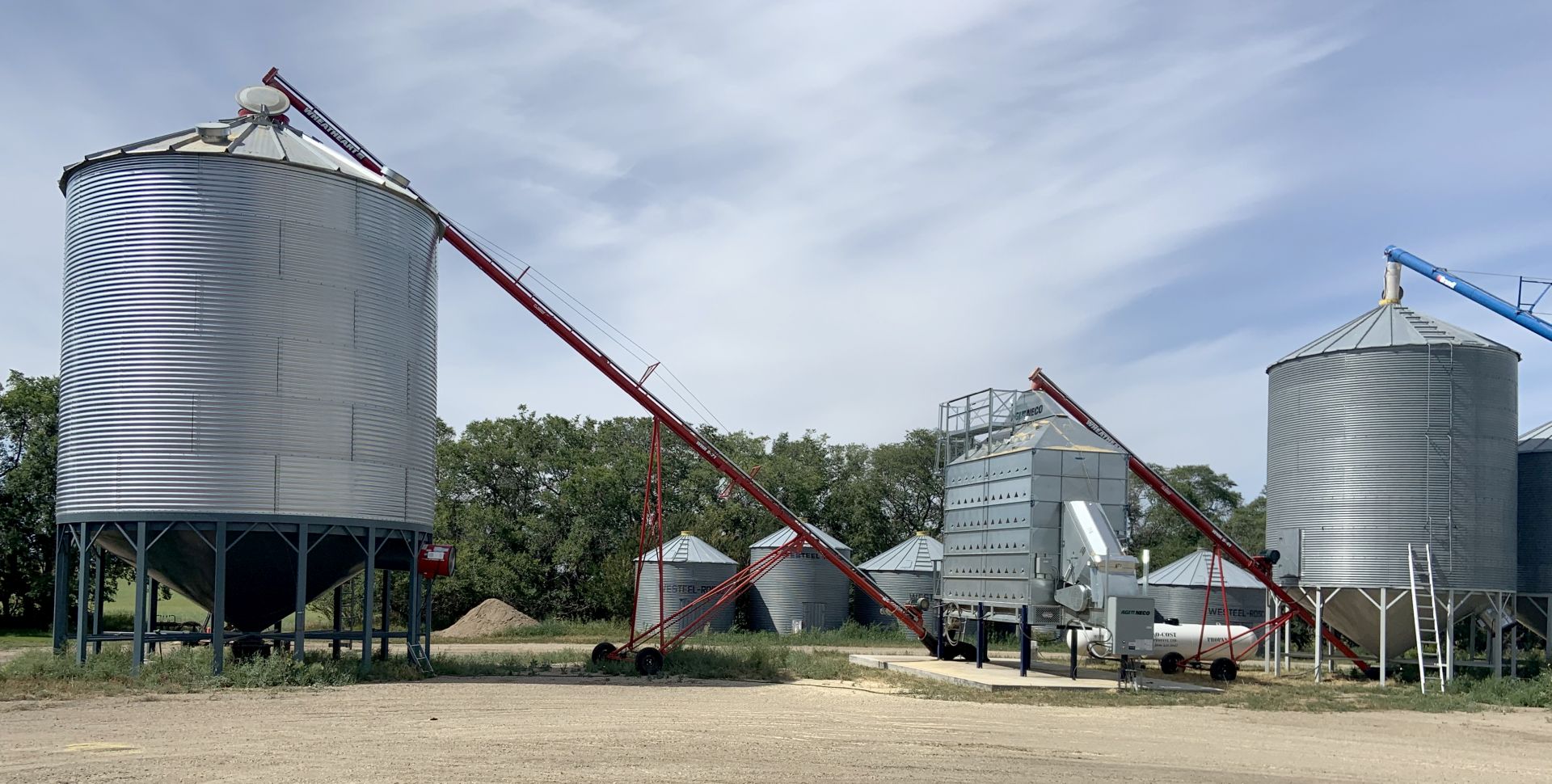
Nolan's grain drying setup in Semans, SK
Mixed flow dryers reduce the risk of crop damage, resulting in higher test weights. This drying process helps mature the kernels and brings out the rich colour evenly, producing higher quality grain with more consistent results. This dramatic difference in quality increases profitability and improves yield.
It's not too late – contact us to book your dryer install with Flaman today.
-----
For more information on our grain handling and grain drying solutions, talk to one of our agriculture specialists at your nearest Flaman location.
Posted in Product Information | Tagged with grain systems grain handling grain drying NECO grain dryer mixed flow continuous flow | More articles by Calla Simpson
Early season utilization: Increase the grade of your grain with a NECO Grain Dryer
Posted by Calla Simpson Aug 26, 2020
As harvest is well underway in most areas of the province, many producers are utilizing their grain dryers early on this season and increasing the available window to combine. Some farmers have even noticed increases in their durum quality as their grade improves after drying.
 20% moisture durum before going into the NECO grain dryer (left) and 14.5% moisture durum after being dried (right)
20% moisture durum before going into the NECO grain dryer (left) and 14.5% moisture durum after being dried (right)
Nolan Gettis, a farmer in central Saskatchewan, discusses how his NECO Grain Dryer has improved his operation:
“Two years ago, I would have been waiting to combine saying, ‘It’s getting close’. Right now, I’m full on harvesting because I have this dryer as a tool. I’m not waiting to use it. I’m literally taking off 20% durum and it’s coming out dry and just shining. It’s amazing how much better this durum looks once it comes out of that dryer. When you have a crop of unicorn #1 amber durum, you’ve gotta go get it.
I’d have to say the biggest benefit of this NECO dryer is that we’ve taken on more acres this year and I’ve already conquered that land without buying another combine. I have three bins on the go; a dry bin, an aeration bin, and the dryer. It’s a total harvest management tool.”

Nolan's grain drying setup in Semans, SK
Mixed flow dryers reduce the risk of crop damage, resulting in higher test weights. This drying process helps mature the kernels and brings out the rich colour evenly, producing higher quality grain with more consistent results. This dramatic difference in quality increases profitability and improves yield.
It's not too late – contact us to book your dryer install with Flaman today.
-----
For more information on our grain handling and grain drying solutions, talk to one of our agriculture specialists at your nearest Flaman location.
Posted in Product Information | Tagged with grain systems grain handling grain drying NECO grain dryer mixed flow continuous flow | More articles by Calla Simpson
How to Address Farming Challenges with the Right Equipment
Posted by Calla Simpson Aug 20, 2020
With grain bagging at your side, farming challenges won’t loom over your head.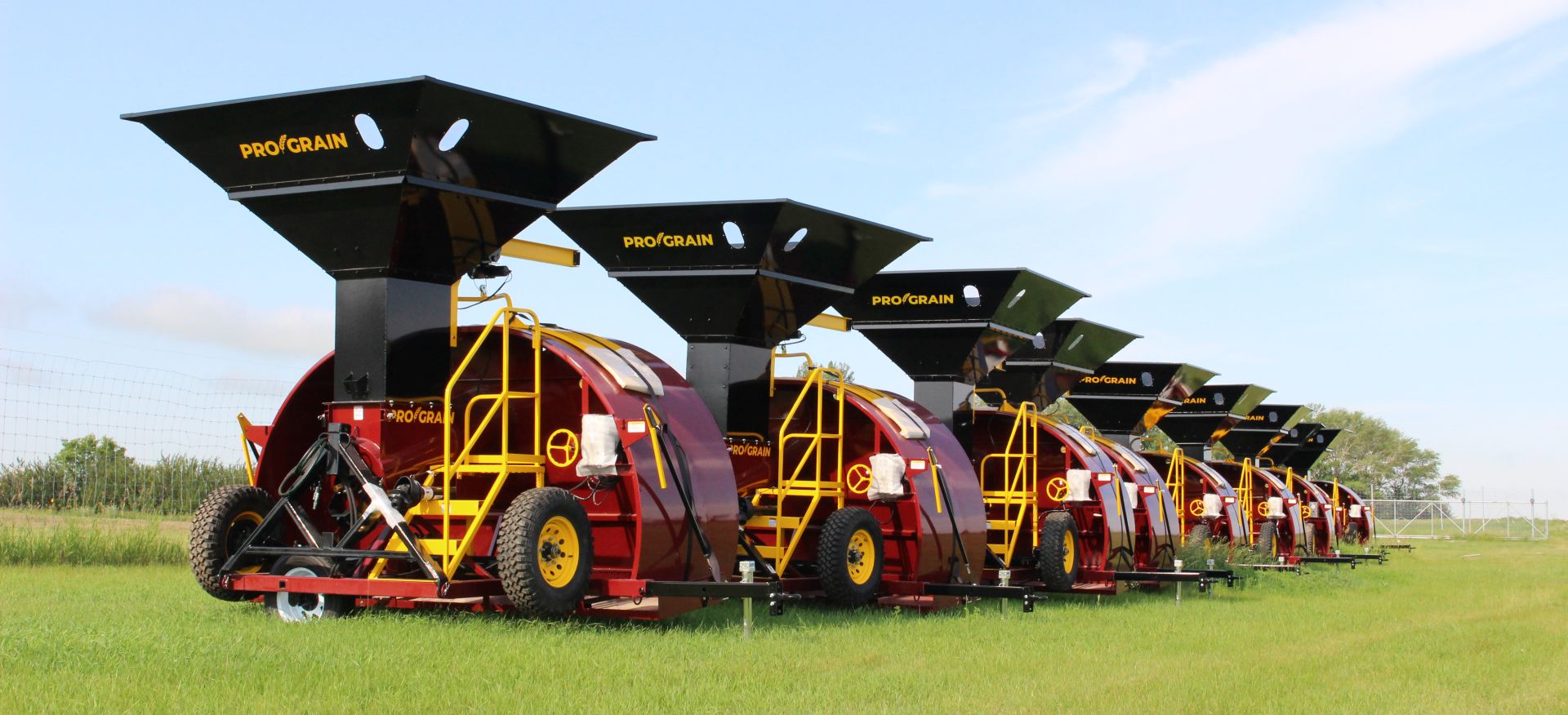
As we begin to enter the new days of the upcoming farming season, there’s one constant: the harvest challenges that will lie ahead. A huge part of being in the farming business is being able to anticipate challenges and to pivot to them, and every good farmer understands that. However, every good farmer also desires to rise above the challenges presented to them, which is where the right equipment and the right mindset come into play.
In the 2019 harvest season, we saw challenges ranging from supply chain management issues and an excess of labour costs to late harvest starts, inclement fall weather, the prediction of lowered storage availability, and an abundance of leftover crops. As the 2020 season begins to come to shape overhead, it’s our job as farmers to think ahead and problem solve the best way we know how.
A great way to pivot and stay on top of things is through the use of grain bags, which have been a huge help to farmers looking for ways to minimize cost along with improving harvest efficiency.
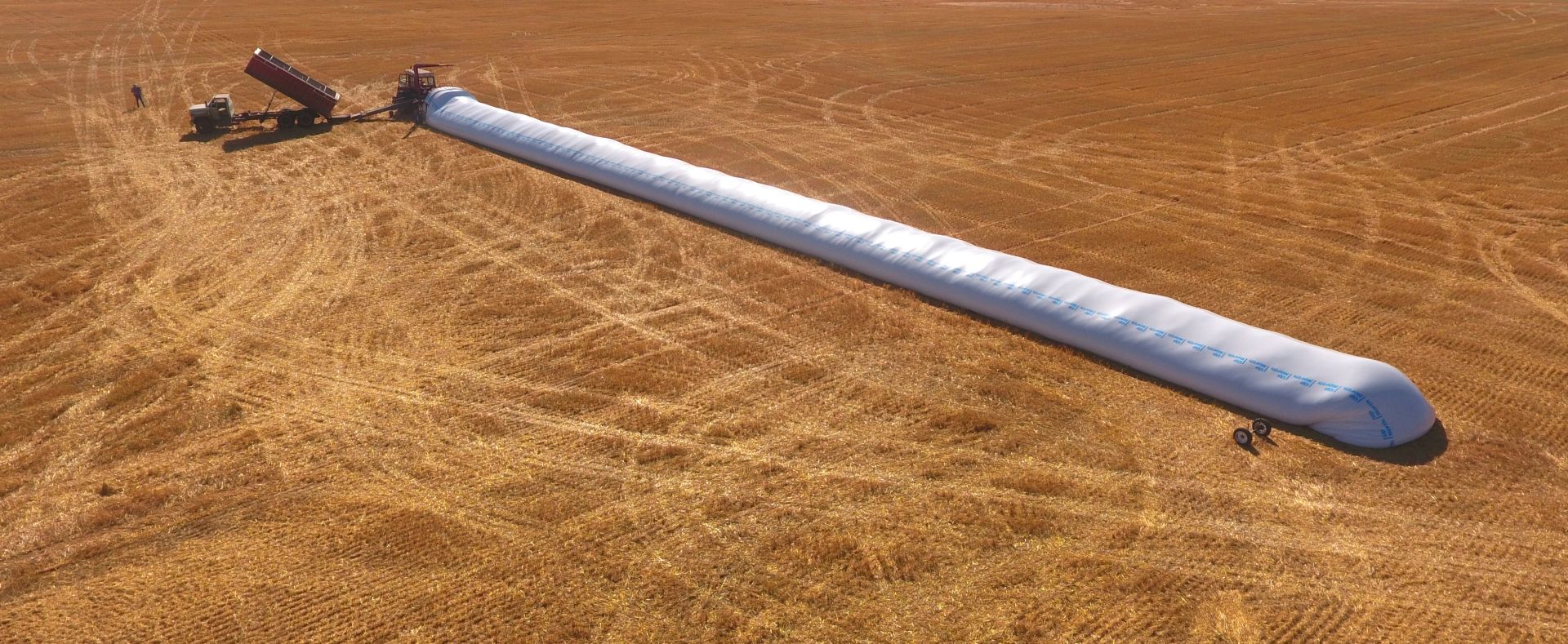
Challenges farmers are facing in 2020
The 2020 harvest season is a unique one as the COVID-19 pandemic hit the globe and affected each and every farm operation. As farmers, the job is always to continue harvesting and providing for others — which can sometimes prove to be a hard thing. As we enter a new season, the issues facing farmers are:
Storage: there is a struggle to find adequate storage space for grain and harvest amid the pandemic.
Supply Chain Issues: stemming from a lowered labour force and leftover grain.
Inventory: confusion in inventory forecasting.
Physical Distancing: the need for physical distancing and increased health measures among labour forces on farms.
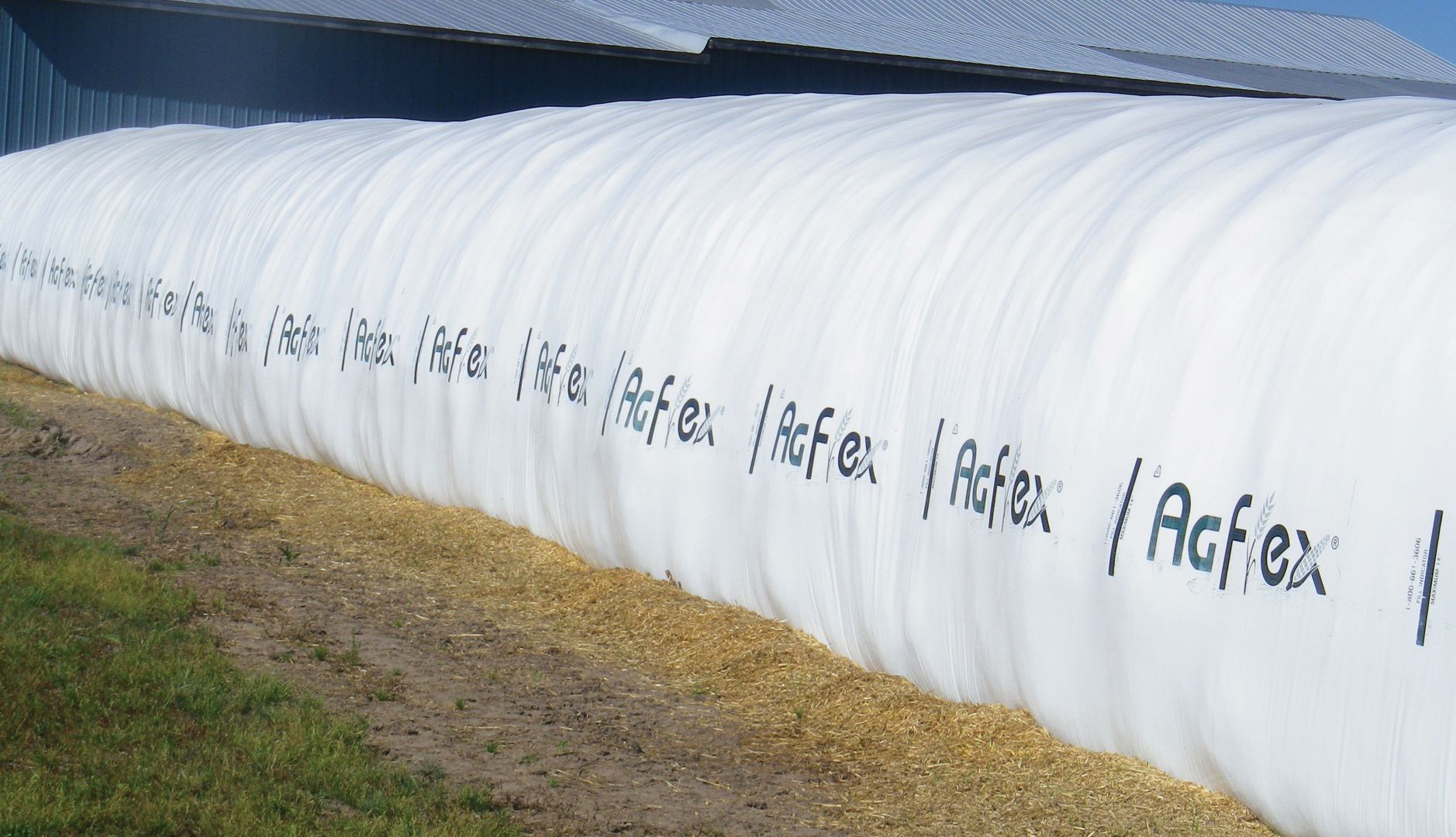
How can grain bags help farming challenges?
Flexibility is everything when it comes to farming, whether it be through finding new storage methods or by looking for new ways to cut costs. By using grain bags in your farming operation, you’ll be able to deal with many of the common farm operation challenges that harvesters are facing in 2020.
You’re also able to maximize space and minimizing risk (both financially and personally). The addition of grain bagging equipment and grain bags leads to optimized space on your farm, as well as a lowered need for labour, grain transportation, and grain storage. Here’s how:
Flexible Storage: grain bags allow you to store your harvest directly on your land, completely eliminating the need for extra labour to transport and store grain externally.
Reduced Costs: grain bags simply cost less than other grain storage methods — up to 2/3 less — making them a no-brainer when it comes to downsizing costs in your farming operation.
Increased Productivity: grain bags allow for better time management in your harvesting operation, from less downtime on the combines to more productivity from the workforce at hand.
Harvest Faster: grain bags are helpful when it comes to supply chain issues and excess crops, as they’ll keep your harvest safe from wildlife, spoilage, and weather while you wait.
Increased Efficiency: grain bags help to deal with varied demand, as they offer both efficiency and storage to assist with your needs.
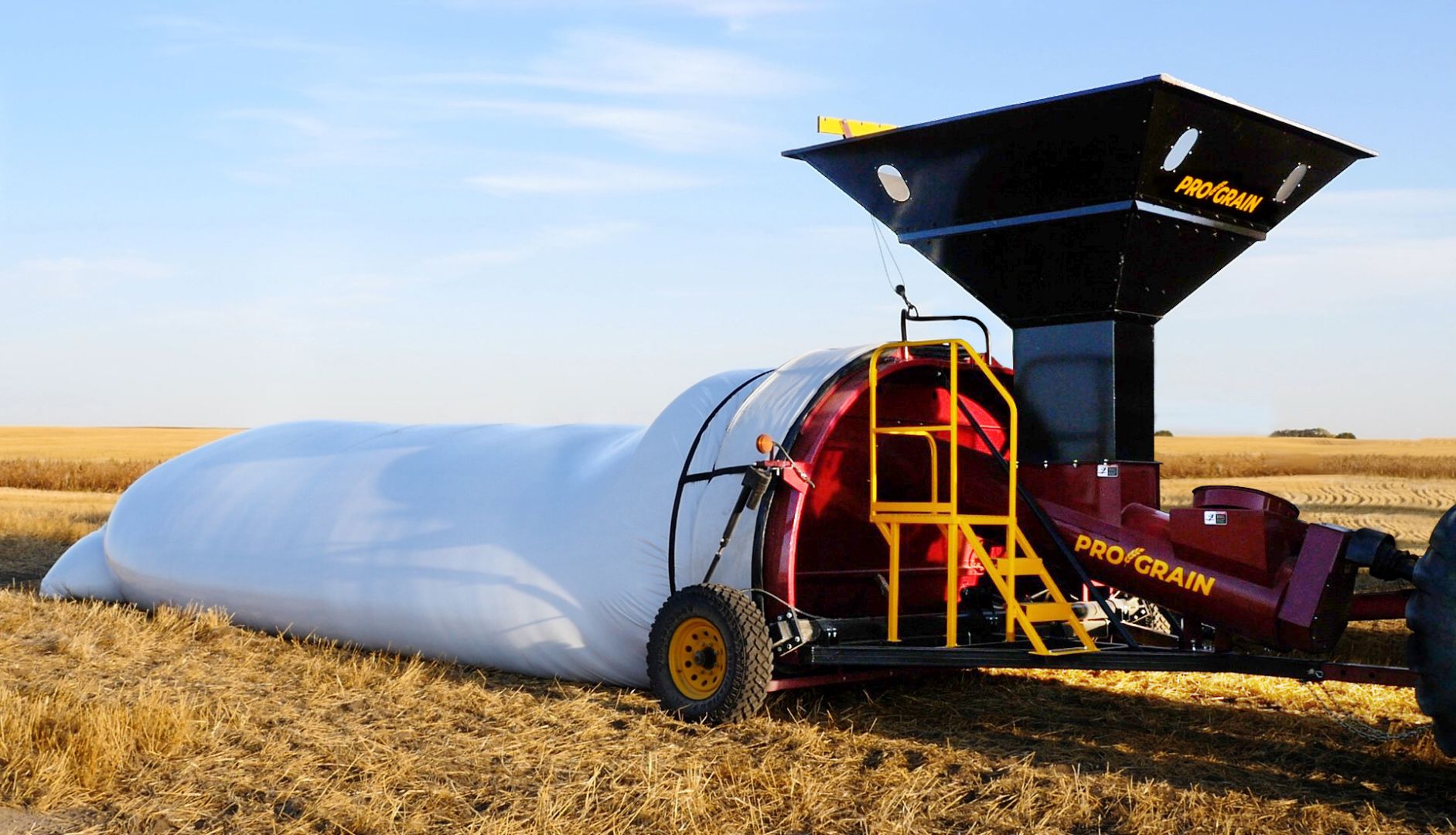
When it comes to challenges, farmers are no stranger to making it work. Farmers are more able to pivot than any other profession in the world, whether it be from weather, cost, or even global pandemics. With grain bags, you’ll be able to take some pressure off of your shoulders when it comes to incoming farming challenges.
-----
Now offering discounted pallet pricing when you buy four or more pallets of grain bags. For more information, talk to one of our agriculture specialists at your nearest Flaman location.
Posted in Ag news | Tagged with Pro Grain grain bags grain bagging grain baggers grain storage harvest | More articles by Calla Simpson
The Top 10 Reasons to Use Grain Bags
Posted by Calla Simpson Aug 04, 2020
Grain bagging has been gaining acclaim and popularity among farmers for being a resourceful, flexible, and time and money-saving grain storage option. The benefits are many, and farmers appreciate the efficiency of this innovative storage technique.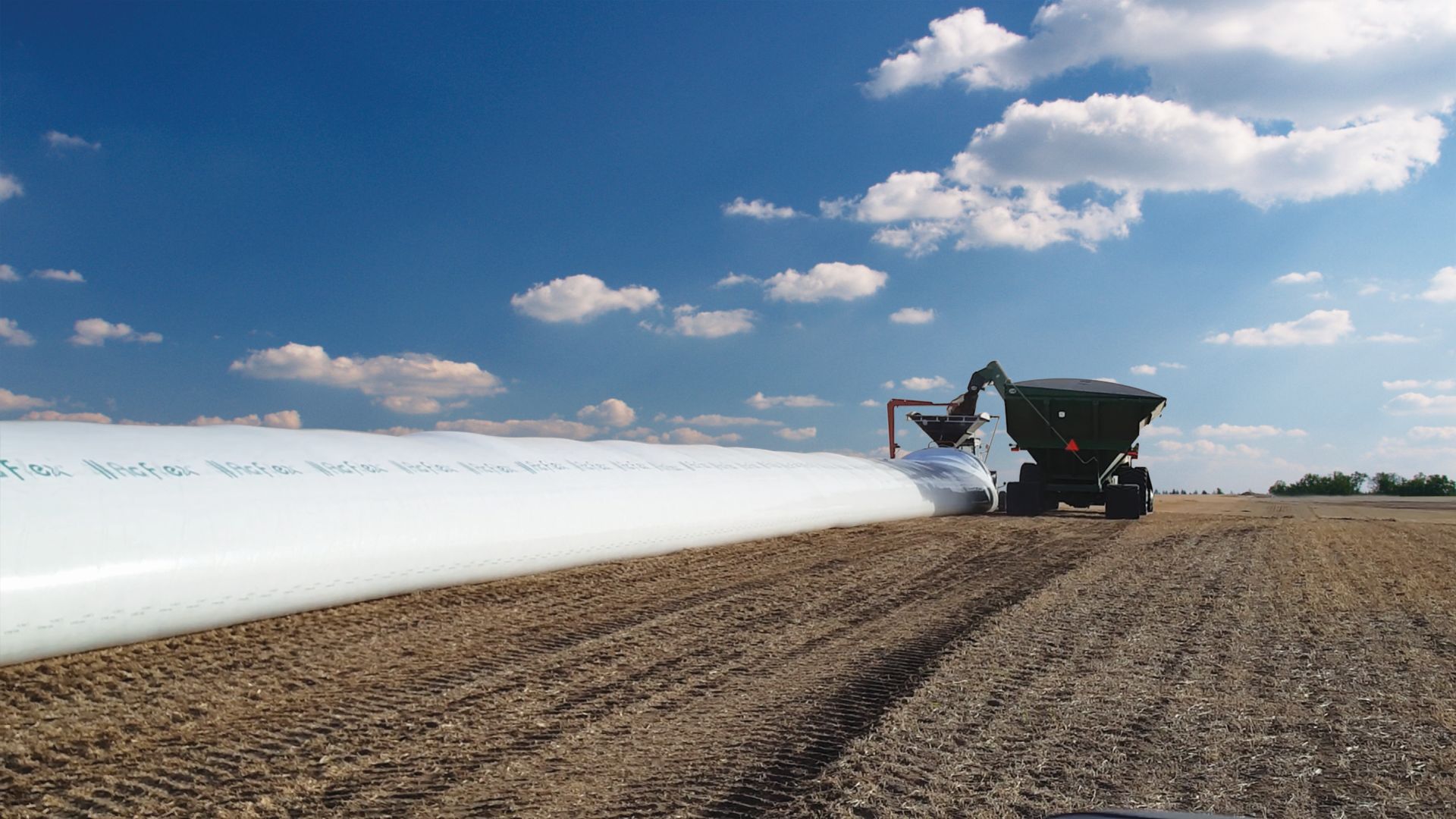
If you bag grain, you can expect to experience the following 10 benefits during your harvest season:
1. Saves the farmer's time.
When you bag grain, you reduce time loading grain into trucks and transporting it to grain bins or elevators. You can harvest the grain and store it right there in the field, which drastically cuts down on work time by eliminating so much back and forth to older, more traditional storage containers.
2. Increases harvest efficiency.
Grain bagging is easily the most flexible and efficient method for storing grain. You can store the bags anywhere that’s convenient (field, farm, or other lots), you have unlimited capacity, you have fewer labour constraints, you can move grain faster, and you can segregate grain variety easily into different storage bags. Overall, the processes during harvest are completely streamlined and made as productive as possible with grain bagging.
3. Improves commodity marketing.
Grain bagging preserves grain due to the ideal environment for grain within the bags themselves. When the bags are sealed, they are airtight, which eliminates the need for preservative chemicals and retains the grain quality. If commodity prices are low, and where storage constraints exist, bagging provides flexible unlimited storage. This allows farmers to control and plan the right time to market the crop for top dollar.
4. Reduces labour problems.
Because fewer trucks are required with grain bagging, your labour inefficiencies and costs will naturally reduce. Grain can be stored in the field where it’s bagged, which lowers the need for additional labourers.
5. Provides a storage solution for rented land.
For farmers who rent additional land and either don’t have their own storage bins, don’t have room in storage bins, or don’t want to deal with the cost and inconvenience of using the elevators, grain bagging allows easy storage for those rented land crops. There are virtually endless amounts of storage when you bag your grain.
6. Allows for unlimited storage capacity.
Even if you don’t rent land, if you have a bumper crop, or if your previous year’s crops are taking up storage space, you can utilize grain storage bags to safely and effectively store unlimited amounts of grain directly in the field.
7. Is a cost-efficient storage option.
You can store your grain in bags for about 7 cents per bushel (or less, in some cases). Alternatively, traditional grain bin storage can range anywhere from 14 cents to 37 cents per bushel, a massive expenditure in comparison to grain bagging.
8. Reliable and easily transportable.
After grain bags are sealed, oxygen levels decrease and carbon dioxide increases. This change in the environment can eliminate several strains of fungal diseases and insects without having to use harsh chemicals. Plus, when you are ready to market and sell the crops, you can unload them after harvest when it’s a more convenient time, more labour is available and truck costs are more sensible.
9. Expands the harvest window.
Farmers can start harvest operations earlier in the season and run later into fall by bagging grain that is higher than average moisture. You can unload the grain and dry it at a later time to lower the chance of bottlenecks at a grain dryer.
10. Improves the ability to avoid weather-related harvest issues.
Because your harvest operation will be moving faster and more efficiently, if there are weather delays or setbacks, you’ll be able to easily pivot and adjust your timeline. Your larger window for harvest also allows greater flexibility in dealing with weather restraints.
To learn more about grain bagging and to see which grain bagging products could improve your harvest capabilities, get in touch with us. We would be happy to walk you through everything you require for your grain bagging needs and answer any questions you might have.
-----
Now offering discounted pallet pricing when you buy four or more pallets of grain bags. For more information, talk to one of our agriculture specialists at your nearest Flaman location.
Posted in Product Information | Tagged with Pro Grain grain bags grain bagging grain baggers grain storage harvest | More articles by Calla Simpson
Dry your grain with ease: Get ahead of harvest this year and book your NECO dryer install with Flaman today
Posted by Calla Simpson Jun 26, 2020
There are many advantages to owning a grain dryer. As we learned last year in Western Canada, harvest 2019 had its challenges; most of which showed up when the crop needed to come off the field. Being able to dry your grain allows you to better manage your timeline and start combining as soon as it’s time to go! The earlier you can get started, the less likely you are to get caught with crop out in the field over winter.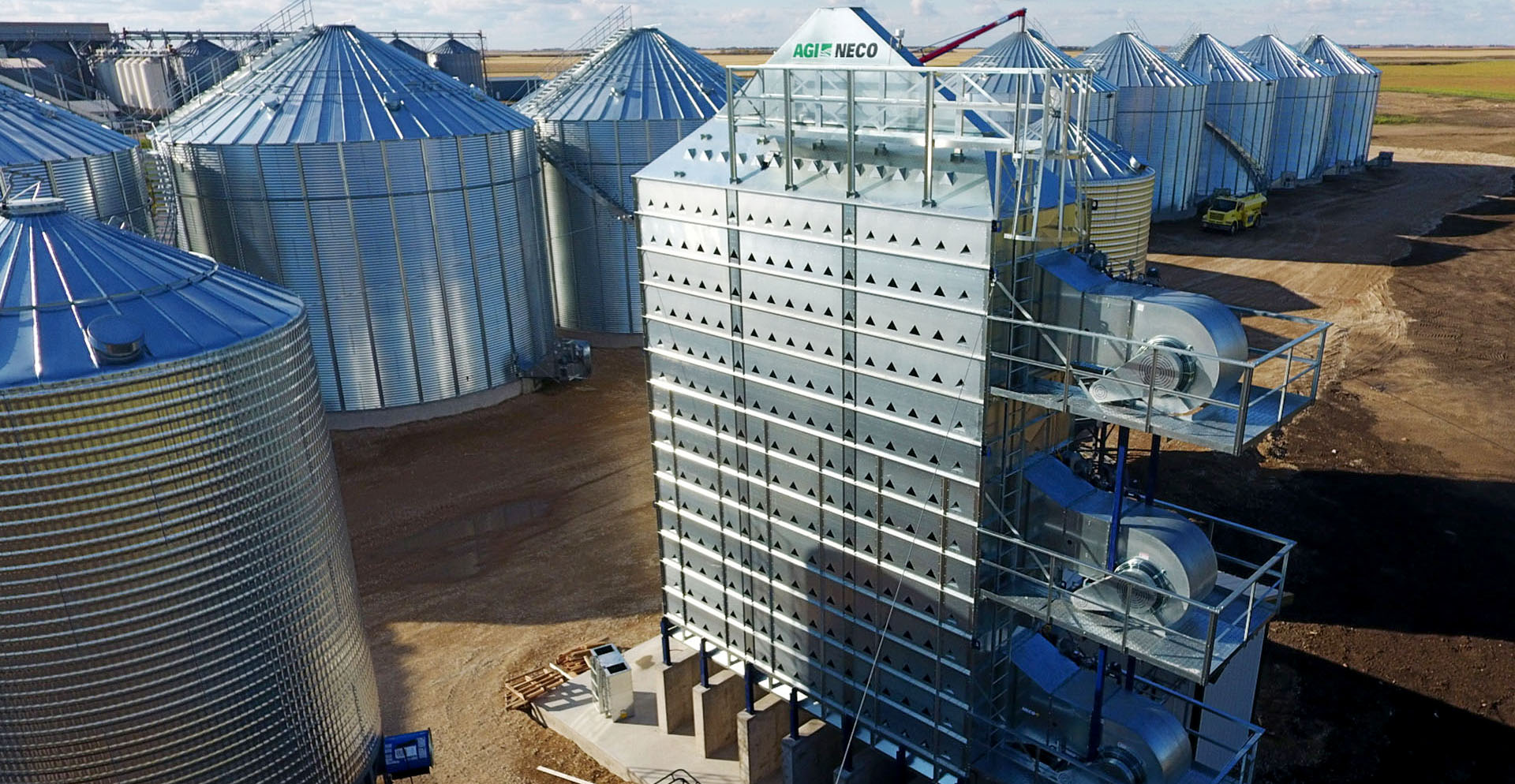
NECO Mixed Flow Grain Dryers are designed to easily and efficiently condition all types of grain for storage. With no screens to clean or unplug, this industry-leading grain dryer is designed not only for its performance, but also its versatility.
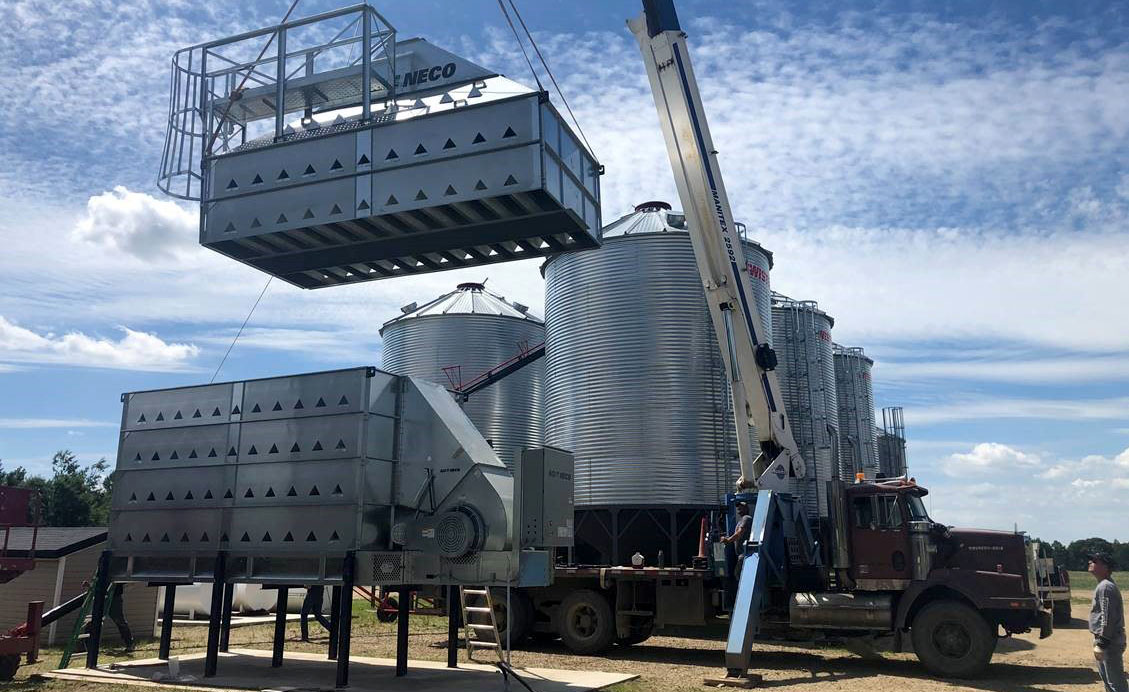
The flexible, modular design of these grain dryers make for easy installation and can be customized and expanded to suit any farming operation.
A time lapse of a NECO Grain Dryer installation near Saskatoon
The NECO Grain Dryer’s mixed flow operation ensures even heating and cooling to provide consistent, high-quality grain. The improved air flow, quieter fans, and unequalled fuel efficiency make this dryer a valuable addition to any farming operation.
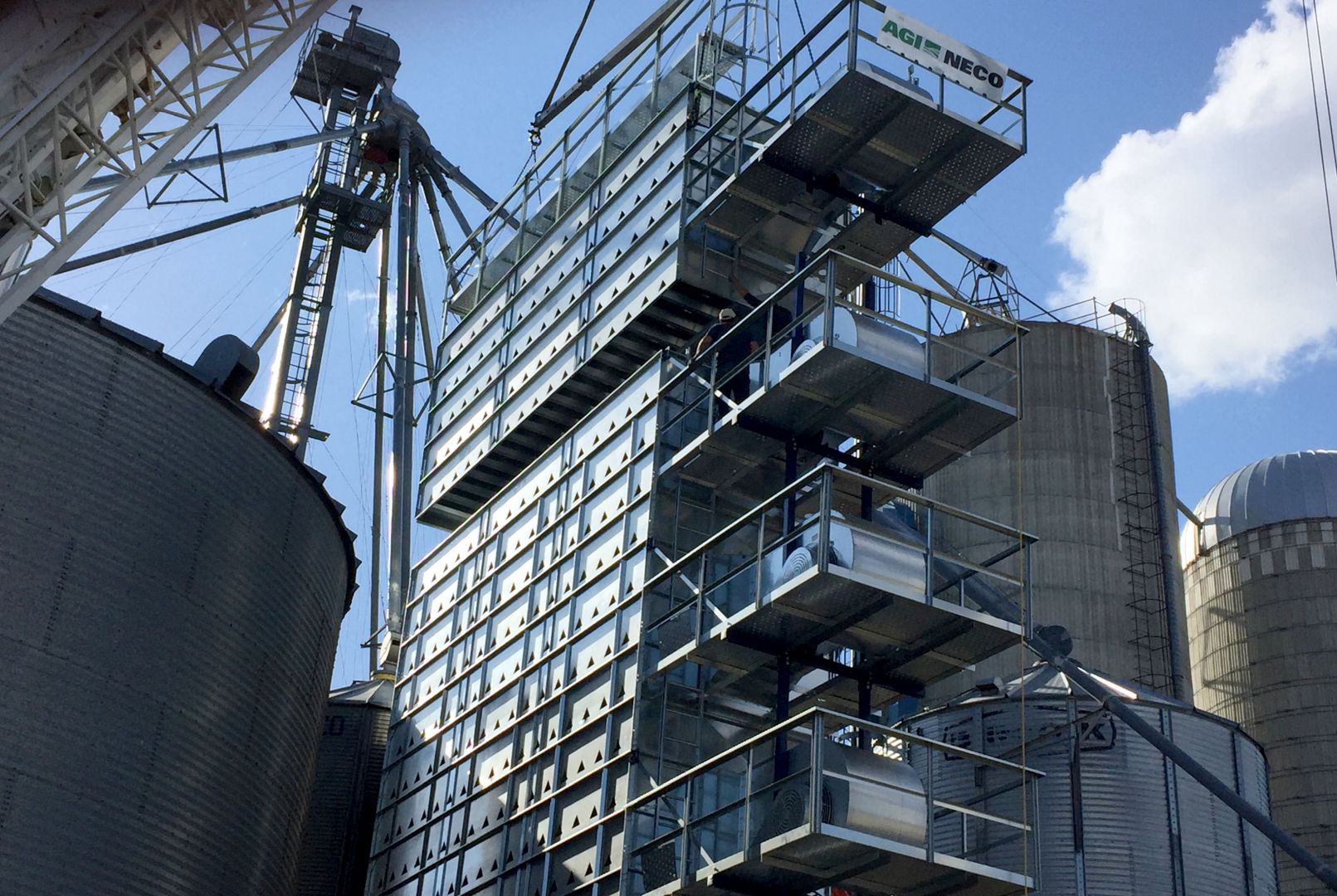
NECO dryers use Commander Control with a Dryer Master moisture control system to protect the quality of your grain and prevent over- or under-drying. The COMMANDnet system allows remote access to your NECO Grain Dryer to monitor its performance from your smartphone or computer – providing you with total control over your dryer wherever you may be.
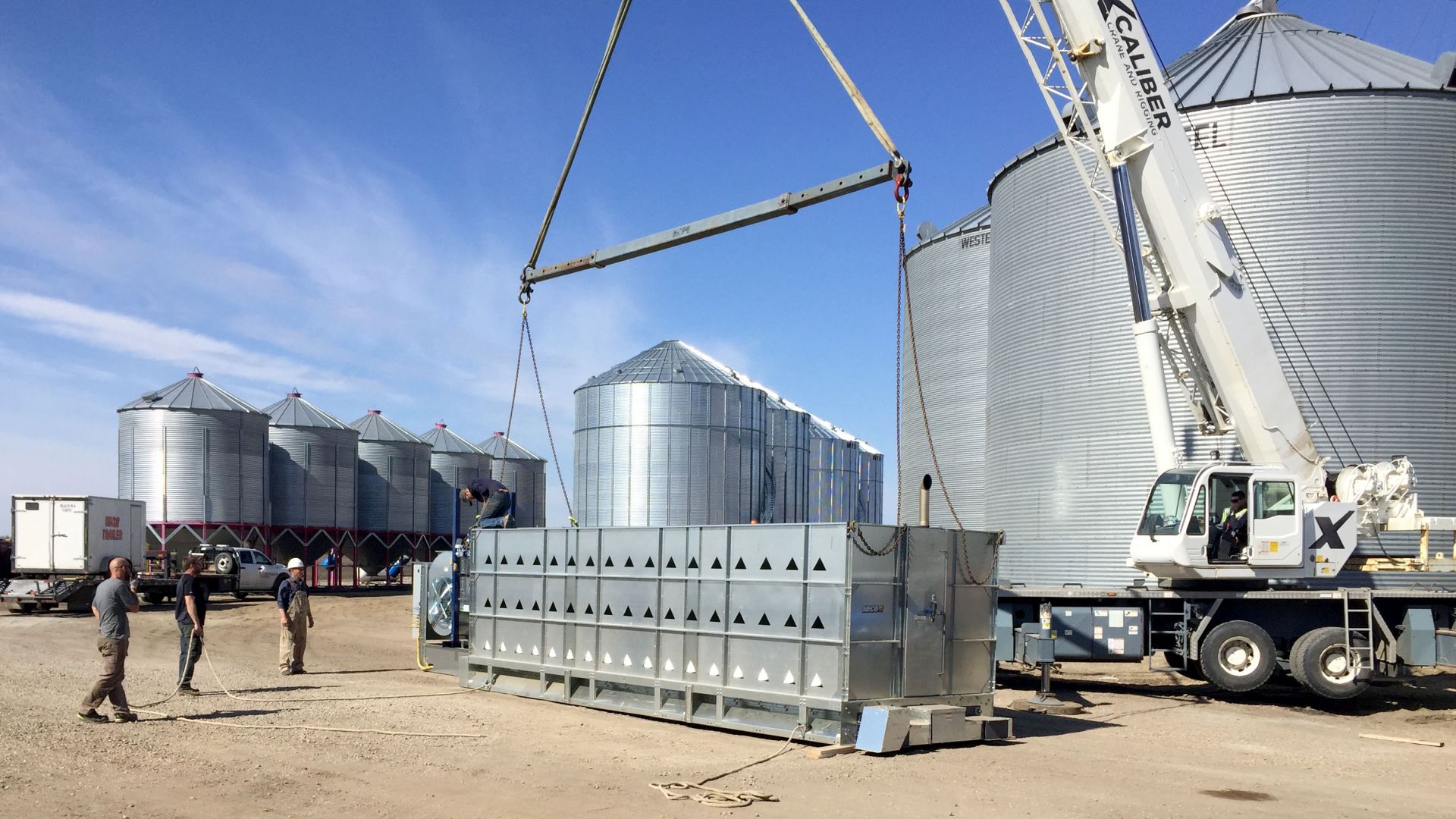
It is never too early to start planning for harvest, as we never know what mother nature has in store for us. Bookings are filling up fast, but there are still a few spots left to get your name on a dryer for fall. Our Grain Systems team can customize a complete grain drying system to suit your needs, guiding the setup and installation, and providing service and maintenance along the way.
Hear first-hand from Flaman customers what a NECO dryer can do for your operation
Be ready to get ahead of harvest this year – contact us to book your dryer install with Flaman today.
-----
For more information on our grain handling and grain drying solutions, talk to one of our agriculture specialists at your nearest Flaman location.
Posted in Product Information | Tagged with grain systems grain handling grain drying NECO grain dryer | More articles by Calla Simpson
Dry your grain with ease: Get ahead of harvest this year and book your NECO dryer install with Flaman today
Posted by Calla Simpson Jun 26, 2020
There are many advantages to owning a grain dryer. Being able to dry your grain allows you to better manage your timeline and start combining as soon as it’s time to go! The earlier you can get started, the less likely you are to get caught with crop out in the field over winter.
NECO Mixed Flow Grain Dryers are designed to easily and efficiently condition all types of grain for storage. With no screens to clean or unplug, this industry-leading grain dryer is designed not only for its performance, but also its versatility.

The flexible, modular design of these grain dryers make for easy installation and can be customized and expanded to suit any farming operation.
A time lapse of a NECO Grain Dryer installation near Saskatoon
The NECO Grain Dryer’s mixed flow operation ensures even heating and cooling to provide consistent, high-quality grain. The improved air flow, quieter fans, and unequalled fuel efficiency make this dryer a valuable addition to any farming operation.

NECO dryers use Commander Control with a Dryer Master moisture control system to protect the quality of your grain and prevent over- or under-drying. The COMMANDnet system allows remote access to your NECO Grain Dryer to monitor its performance from your smartphone or computer – providing you with total control over your dryer wherever you may be.

It is never too early to start planning for harvest, as we never know what mother nature has in store for us. Bookings are filling up fast, but there are still a few spots left to get your name on a dryer for fall. Our Grain Systems team can customize a complete grain drying system to suit your needs, guiding the setup and installation, and providing service and maintenance along the way.
Hear first-hand from Flaman customers what a NECO dryer can do for your operation
Be ready to get ahead of harvest this year – contact us to book your dryer install with Flaman today.
-----
For more information on our grain handling and grain drying solutions, talk to one of our agriculture specialists at your nearest Flaman location.
Posted in Product Information | Tagged with grain systems grain handling grain drying NECO grain dryer | More articles by Calla Simpson
Be ready for harvest 2020: Summer is the time to build your bins & install your grain handling equipment
Posted by Calla Simpson May 29, 2020
As seeding is coming to a close throughout the province, you may be starting to think about the next steps in your farming operation for 2020. This likely includes thoughts of additional Grain Storage, Grain Handling, and even Grain Drying equipment.
It may seem early to plan for harvest, but summer is a great time to build your bins and install your grain handling equipment to move the crop come harvest time. Buying now will ensure your equipment is installed and ready to go in the fall – so you can have peace of mind all season long.

Lean on the Pros
At Flaman, our Grain Systems team is equipped to work with you on developing your yard for the future. Let one of our industry experts come to your yard to measure, draw, and discuss your needs for the coming year. Our tactical approach provides you with various drawings and site layouts that can utilize your existing equipment, and plan for future expansion in a multi-phased strategy.
 Our Specialists can create a yard design based on your operational needs and the desired function of your site.
Our Specialists can create a yard design based on your operational needs and the desired function of your site.
We specialize in full grain handling setups, including a wide range of bucket elevators and pneumatic conveyors – such as the Walinga Ultra-Veyor. Our turn-key offering also includes grain dryer systems, like the NECO Mixed Flow Dryer, as well as grain cleaning and processing facilities, automated bin sites, and producer loading sites. Our team is here to guide the entire setup and installation process of your grain handling system and provide maintenance and service for every item that goes in and out of our doors.

Schedule your appointment today for a free, no commitment site assessment.
-----
For more information on our grain handling and grain drying solutions, talk to one of our agriculture specialists at your nearest Flaman location.
Posted in Ag news | Tagged with grain systems grain handling grain drying grain cleaning turnkey bin site NECO Walinga | More articles by Calla Simpson
Chembine: Canadian-made chemical handling solutions
Posted by Calla Simpson May 04, 2020
We are excited to offer two new products in our Chem Handling lineup: the Chembine Chemical Mixer and the Chembine Hot-Tank.Designed and manufactured in Western Canada, the Chembine Chemical Mixer from Freeform Plastics is an innovative solution for batch mixing chemicals on your farm. With a capacity of 75 US gallons (62.5 imperial gallons), this tank saves you time and money with its faster drain time, new knife block design, and the latest innovation in agitation.
This new chemical mixer was also designed to be more user-friendly and ergonomic, so you won’t have to bend over as often to reach the valves – preventing unnecessary strain on your back.
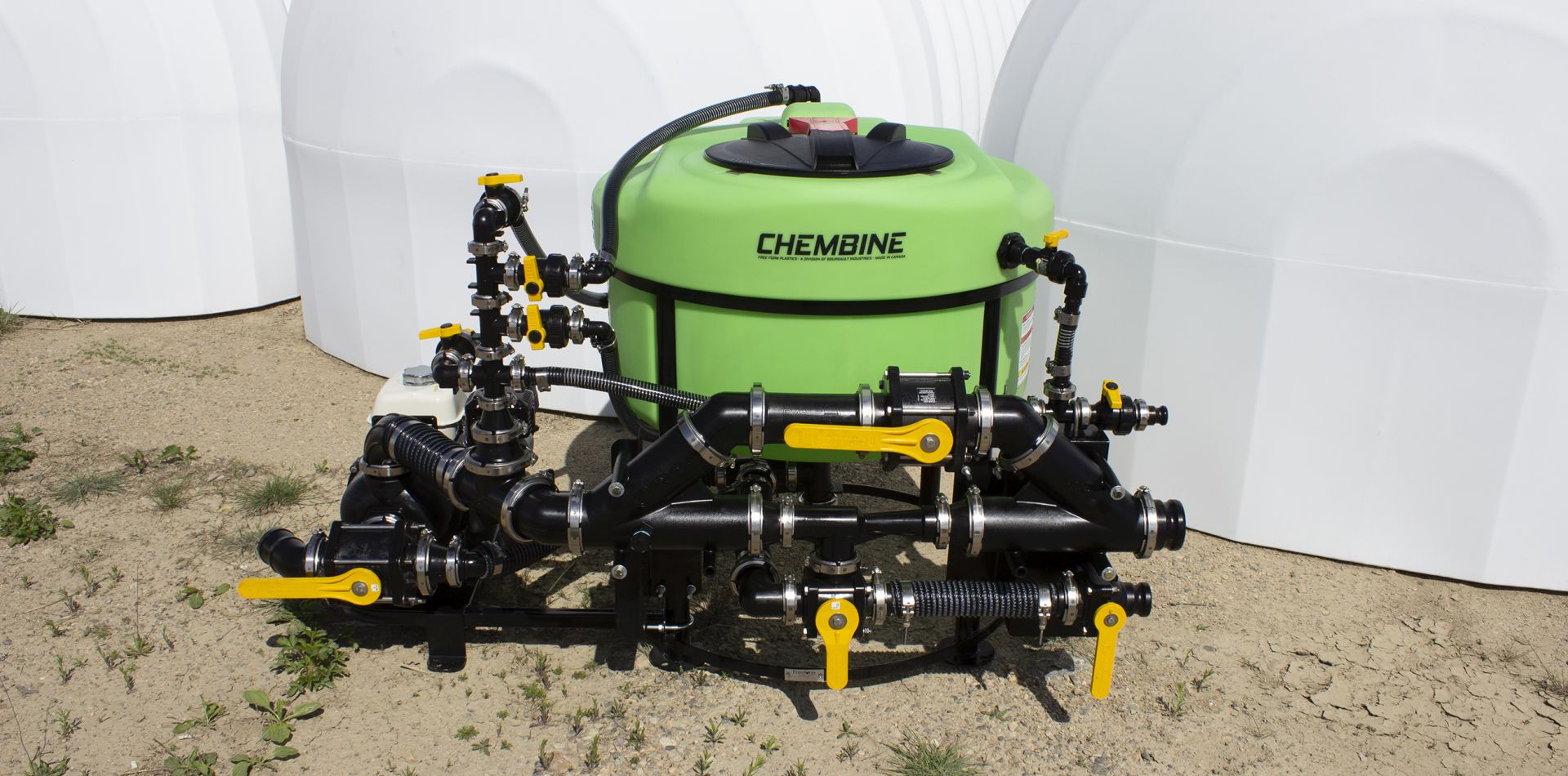
The Chembine is sold without a pump, however there are two optional pump kits available to create a complete system. The first option is a 6.5 HP Honda with a Wetseal Banjo pump, and the other option is a 13 HP electric start Honda with a Hypro pump.
To learn more about the features of the Chembine Chemical Mixer, check out this interview with Freeform Plastics:
The Chembine Hot-Tank is another beneficial product for your farm, as this high-capacity tank can hold up to 1680 US gallons (1400 imperial gallons) at once.
The Hot-Tank will agitate your chemical mix, so that it doesn’t separate. This will allow you to pre-mix your entire chemical load ahead of time, so when the sprayer arrives everything is prepped and ready to go.
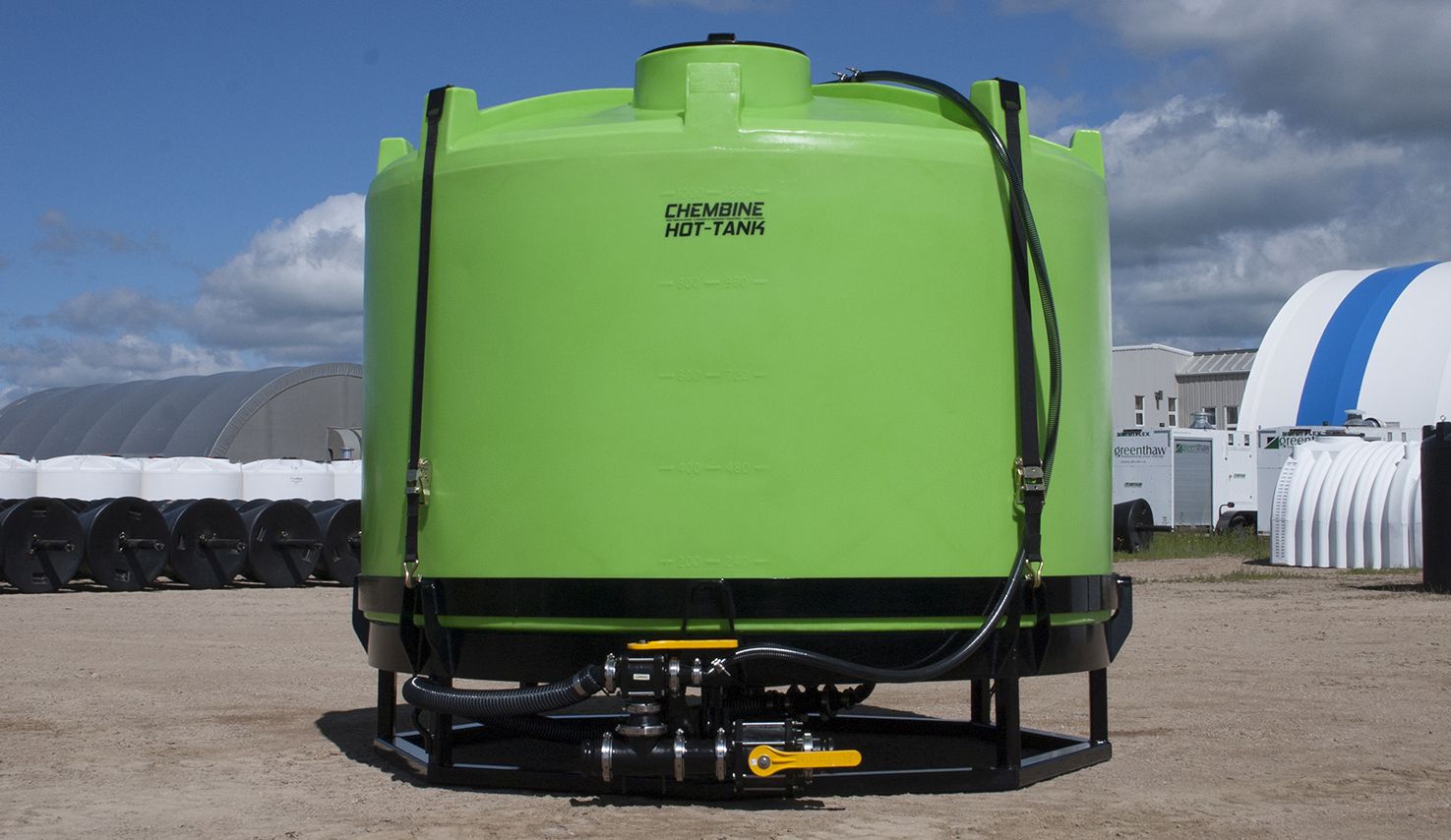
Instead of paying for the tank, the parts, and the labour separately, this convenient alternative comes plumbed up and ready to use – allowing you to spend more time mixing and spraying.
Justin walks through the features of the Chembine Hot-Tank
-----
Read more about these products and view the rest of our Chem Handling solutions.
Posted in Product Information | Tagged with Chembine chemical mixer chemical handling chem tank Hot-Tank | More articles by Calla Simpson

 Locations
Locations
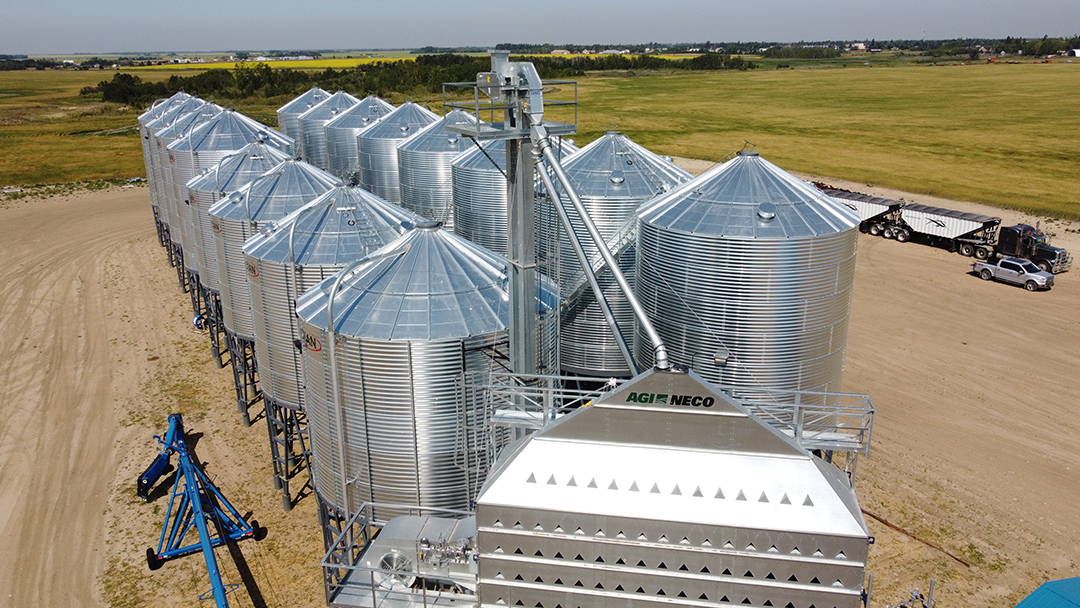
.JPG)
